AP LAWCET 2024 LLB 3 Years Question Paper(Available) :Download Solution PDF with Answer Key
AP LAWCET 2024 Question Paper 3 Years LLB is available for download here. Acharya Nagarjuna University, Guntur on behalf of APSCHE conducted AP LAWCET 2024 exam on June 9, 2024. AP LAWLCET question paper 2024 comprises a total of 120 questions divided into 3 sections.
AP LAWCET 2024 LLB 3 Years Question Paper with Answer Key PDF
| AP LAWCET 2024 3 Years LLB Question Paper with Answer Key | Check Solutions |

Question 1:
____ is the chairperson of Securities and Exchange Board of India, as of April 2024.
View Solution
As of April 2024, the current chairperson of the Securities and Exchange Board of India (SEBI) is Ms. Madhabi Puri Buch. Quick Tip: Stay updated with the latest appointments in important regulatory bodies such as SEBI, as they often have significant impacts on financial regulations.
____ is the current chief minister of Tamil Nadu.
View Solution
As of now, Shri M. K. Stalin is the current Chief Minister of Tamil Nadu. Quick Tip: Stay updated with political appointments as they influence the governance of a state.
____ is the current Governor of Odisha.
View Solution
Shri Raghubar Das is the current Governor of Odisha. Quick Tip: Governor appointments are key positions in the states, and it's important to stay informed about the officials in charge.
____ is the current president of National Company Law Tribunal.
View Solution
Shri Justice Ramalingam Sudhakar is the current president of the National Company Law Tribunal. Quick Tip: The position of the president of the National Company Law Tribunal is an important judicial appointment in India.
Which entity developed and constructed India’s first hydrogen fuel cell ferry?
View Solution
India's first hydrogen fuel cell ferry was developed and constructed by Cochin Shipyard. Quick Tip: India is advancing in green technologies such as hydrogen fuel cell-based transport. Keep an eye on innovations in the maritime sector.
United Nations Secretary-General has appointed which Indian as his special representative for disaster risk reduction?
View Solution
Kamal Kishore has been appointed as the special representative for disaster risk reduction by the United Nations Secretary-General. Quick Tip: Keep track of important appointments in international organizations such as the United Nations for updated knowledge on global leadership in disaster management.
Which institution introduced the UTSAH portal recently?
View Solution
The UTSAH portal was introduced by the University Grants Commission (UGC) to promote innovation and digital transformation in higher education. Quick Tip: Stay informed about new educational portals launched by significant educational bodies like UGC to support digital initiatives in India.
International Human Rights Day is celebrated every year on ____ .
View Solution
International Human Rights Day is celebrated annually on December 10th to commemorate the adoption of the Universal Declaration of Human Rights by the United Nations. Quick Tip: Keep an eye on international observances such as Human Rights Day to understand global movements and discussions on human rights.
Who was the first Governor of the 'Reserve Bank of India' in free India?
View Solution
C.D. Deshmukh was the first Indian to hold the position of the Governor of the Reserve Bank of India in independent India, serving from 1943 to 1949. Quick Tip: The Governor of RBI plays a critical role in shaping the monetary policy of the country, so knowing the historical figures in this position is important.
Which statutory law is there to protect our literary, cultural, artistic, and creative works?
View Solution
The Copyright Act is the statutory law that helps protect the rights of creators of literary, cultural, artistic, and creative works. Quick Tip: Copyright protects intellectual property rights related to creative works such as books, art, music, and software.
Penicillin was discovered by ____.
View Solution
Penicillin was discovered by Alexander Fleming in 1928, and it became one of the most important antibiotics in medical history. Quick Tip: Penicillin revolutionized medicine by offering a powerful tool to fight bacterial infections.
Who among the following was elected unopposed as the President of India?
View Solution
Neelam Sanjiva Reddy was elected unopposed as the President of India in 1977. Quick Tip: Unopposed elections often reflect the consensus and unity in the political environment of that time.
Who was the first Chief Justice of the Supreme Court in free India?
View Solution
Justice Harilal J. Kania was the first Chief Justice of the Supreme Court of India after independence. Quick Tip: The first Chief Justice plays a crucial role in shaping the judiciary of the nation after independence.
Hirakud dam is on the river ____.
View Solution
Hirakud Dam, located in Odisha, is built across the Mahanadi River and is one of the longest earthen dams in the world. Quick Tip: Hirakud Dam is crucial for flood control, irrigation, and power generation in the Mahanadi River basin.
The Maurya Empire, one of the largest and most powerful empires in ancient India, was founded by ____.
View Solution
Chandragupta Maurya was the founder of the Maurya Empire, which became one of the most influential empires in Indian history. Quick Tip: Chandragupta Maurya was mentored by Chanakya, whose guidance led to the formation of a vast empire.
Which of the following is NOT a fundamental right guaranteed by the Constitution of India?
View Solution
The Right to Property was originally a fundamental right under the Constitution of India, but it was later removed and made a legal right through the 44th Amendment Act of 1978. Quick Tip: Keep in mind that fundamental rights can be amended. The Right to Property is no longer a fundamental right, but it still holds significance as a legal right.
What is the minimum age required to become a member of the Legislative Assembly (Vidhan Sabha) in India?
View Solution
According to the Constitution of India, the minimum age required to become a member of the Legislative Assembly (Vidhan Sabha) is 21 years. Quick Tip: The minimum age requirements for various elected offices in India are outlined in the Constitution. Keep these age limits in mind for election-related questions.
The largest delta in the world is formed by which of the following rivers?
View Solution
The largest delta in the world, the Sundarbans Delta, is formed by the confluence of the Ganges and Brahmaputra rivers. Quick Tip: The Ganges-Brahmaputra Delta is one of the most fertile regions in the world and an important geographical feature.
Which country is hosting the 2024 Summer Olympics?
View Solution
The 2024 Summer Olympics will be hosted by France in Paris. Quick Tip: Olympic Games are hosted by different countries every 4 years. Stay informed about the upcoming Olympic hosts and their preparations.
Who was the founder of the Vijayanagara Empire in South India?
View Solution
Harihara I, along with his brother Bukka Raya I, founded the Vijayanagara Empire in 1336 AD in South India. Quick Tip: The Vijayanagara Empire was one of the most powerful and prosperous empires in South Indian history.
Who was the Viceroy of India at the time of the Jallianwala Bagh massacre in 1919?
View Solution
Lord Chelmsford was the Viceroy of India during the Jallianwala Bagh massacre in 1919, which was one of the most tragic events in India's struggle for independence. Quick Tip: The Jallianwala Bagh massacre played a key role in galvanizing the Indian independence movement.
Rohingyas are refugees from ____.
View Solution
The Rohingyas are an ethnic group who have been refugees primarily from Myanmar, facing persecution in the Rakhine state. Quick Tip: Rohingya refugees have faced significant humanitarian challenges, with many fleeing to neighboring countries like Bangladesh and beyond.
Faizabad is ____.
View Solution
Faizabad is the former name of Ayodhya Cantt, a city in Uttar Pradesh, which is famous for its religious and historical significance, especially in the context of Ramayana. Quick Tip: Faizabad and Ayodhya are significant cities in Indian history, especially with regard to religious and cultural heritage.
The small pieces of rocks that move around the sun are called ____.
View Solution
Meteoroids are small pieces of rock or metal that move around the sun and become meteors when they enter the Earth's atmosphere. Quick Tip: Meteoroids, when they enter the atmosphere and burn up, are called meteors. If they reach the Earth’s surface, they are known as meteorites.
The Indian National Fruit is ____.
View Solution
Mango is the national fruit of India, known for its sweetness and cultural significance in Indian cuisine and tradition. Quick Tip: Mango is often referred to as the "King of Fruits" and is widely celebrated in India.
United Nation was established in ____.
View Solution
The United Nations (UN) was established on October 24, 1945, after the end of World War II to promote international cooperation and maintain peace. Quick Tip: The United Nations plays a critical role in maintaining global peace and security through its various specialized agencies.
The Blue planet in the Solar System is ____.
View Solution
Earth is called the "Blue Planet" because of its blue oceans and atmosphere, visible from space. Quick Tip: Earth is the only known planet in the solar system to support life due to its atmosphere and liquid water.
The longest known river on earth is ____.
View Solution
The Nile is the longest known river in the world, flowing through northeastern Africa, and it is about 6,650 km long. Quick Tip: The Nile River holds the record for the longest river in the world, followed by the Amazon River in South America.
Manganin is an alloy of ____.
View Solution
Manganin is an alloy composed of copper, manganese, and nickel. It is commonly used in the construction of resistors. Quick Tip: Manganin is known for its stable resistance over a wide range of temperatures, making it useful in precision resistors.
Father of Green Revolution, M.S. Swaminathan was recently awarded ____.
View Solution
M.S. Swaminathan, the Father of the Green Revolution in India, was recently awarded the Padma Vibhushan, one of the highest civilian awards in India. Quick Tip: The Padma Vibhushan is awarded for exceptional and distinguished service in any field including public affairs, art, literature, science, etc.
The area covered by forest in India is approximately about?
View Solution
According to the Forest Survey of India, approximately 33% of India’s total land area is covered by forests. Quick Tip: Forests play a crucial role in maintaining ecological balance. Keep track of environmental statistics like forest cover for better understanding of natural resources.
Israel shares borders with ____.
View Solution
Israel shares borders with Lebanon, Syria, Jordan, and Egypt, which are located to its north, northeast, east, and southwest respectively. Quick Tip: Familiarizing yourself with the geopolitical boundaries of countries helps in understanding international relations and conflicts.
According to the cultural history of India, 'Panchayatan' is:
View Solution
'Panchayatan' is a temple construction style that involves the central shrine with four subsidiary shrines at the corners. It became prominent in Indian architecture during the medieval period. Quick Tip: Panchayatan style is an example of Vastu Shastra principles being applied in temple construction in India.
Who was the first Mughal Emperor?
View Solution
Babur was the founder of the Mughal Empire in India. He ascended the throne in 1526 after defeating Ibrahim Lodi in the Battle of Panipat. Quick Tip: Babur's victory at Panipat marked the beginning of the Mughal era in India, shaping its culture and governance.
Indian state which shares border with maximum number of other states is ____.
View Solution
Uttar Pradesh shares borders with 8 states, making it the Indian state with the maximum number of state borders. Quick Tip: Uttar Pradesh is strategically located in North India and shares borders with multiple states, making it a key state for political, economic, and cultural exchanges.
Who was the first British Governor-General of India?
View Solution
Warren Hastings was the first British Governor-General of India, serving from 1773 to 1785. Quick Tip: Warren Hastings played a crucial role in the establishment of British control in India and was responsible for several reforms during his tenure.
SGST was implemented in India from ____.
View Solution
SGST (State Goods and Services Tax) was implemented in India from 1st July 2017, as a part of the Goods and Services Tax (GST) regime. Quick Tip: GST was a significant tax reform that unified the Indian market under one indirect tax system.
Who is the Chief Election Commissioner in the 2024 Parliamentary \& Assemblies Elections?
View Solution
Rajiv Kumar is the Chief Election Commissioner of India and will oversee the 2024 Parliamentary \& Assemblies Elections. Quick Tip: The Chief Election Commissioner plays a crucial role in overseeing the electoral process and ensuring fair and transparent elections in India.
The 'World Consumer Rights Day' is celebrated every year on ____.
View Solution
World Consumer Rights Day is celebrated on 15th March each year to raise awareness about consumer rights and protect the interests of consumers. Quick Tip: World Consumer Rights Day focuses on highlighting the importance of consumer protection and promoting safe and ethical consumer practices globally.
How many countries have been successful in making soft landing on the moon so far?
View Solution
As of now, six countries have successfully achieved soft landings on the moon: the United States, the Soviet Union, China, India, Israel, and Japan. Quick Tip: The soft landing on the moon is a significant achievement in space exploration, as it demonstrates advanced technological capabilities.
What is 'Swachhadhara' scheme?
View Solution
Swachhadhara is a Government of India initiative for cleaning and maintaining water bodies across the country, promoting cleanliness and sustainability. Quick Tip: Water bodies cleaning initiatives are crucial for maintaining ecological balance and ensuring clean drinking water resources.
Seeing the pattern below, fill in the blank space with the correct option:
CEGI \, JLMP \, NPRV \, ____
View Solution
The given pattern follows a series of abbreviations, and the correct continuation of this pattern is QSUZ. Quick Tip: When solving pattern recognition questions, always look for logical sequences or repetitions in the elements provided.
What is the order of words mentioned below as per dictionary?
1. Orient, 2. Organ, 3. Origin, 4. Organic
View Solution
The correct order of words as per the dictionary is "Organic", "Orient", "Origin", and "Organ". Hence, the correct order is 2413. Quick Tip: When sorting words alphabetically, always compare the first letter first, then the second, and so on.
Choose the odd one out.
View Solution
Russia's currency is Ruble, not "Rubal". All other countries listed have correct currency names. Quick Tip: Always cross-check currency names to avoid common errors when dealing with international currencies.
Average age of 10 chess players is 32 years. When the age of their coach is added, their average age becomes 34 years. The age of their coach is ____.
View Solution
The total age of the 10 players is \( 10 \times 32 = 320 \). When the coach is added, the total age of the 11 people becomes \( 11 \times 34 = 374 \). Therefore, the coach’s age is \( 374 - 320 = 54 \) years. Quick Tip: In average-related questions, use the formula: \[ New average = \frac{Total sum of ages}{Number of people}. \]
Which island nation in the Indian Ocean declared a state of environmental emergency in 2020, after a massive oil spill from a grounded Japanese ship threatened its pristine coral reefs and marine biodiversity?
View Solution
Mauritius declared a state of environmental emergency in 2020 following an oil spill from a Japanese ship that threatened the island's coral reefs and marine biodiversity. Quick Tip: Stay updated with environmental news as these incidents often affect ecosystems and biodiversity.
Who is the President of the Board of Control for Cricket in India (BCCI)?
View Solution
Sourav Ganguly is the current President of the Board of Control for Cricket in India (BCCI). Quick Tip: The president of the BCCI plays a crucial role in overseeing cricket in India and representing it internationally.
Who won the 2021 Booker Prize for Fiction for the novel 'The Promise'?
View Solution
Damon Galgut won the 2021 Booker Prize for Fiction for his novel "The Promise". Quick Tip: The Booker Prize is one of the most prestigious awards for literary excellence in the English language.
Which country has announced its plan to build a controversial dam on the Blue Nile, raising concerns about its impact on downstream countries like Sudan and Egypt?
View Solution
Ethiopia announced plans to build the Grand Ethiopian Renaissance Dam (GERD) on the Blue Nile, which has caused concerns in Sudan and Egypt due to potential water flow disruptions. Quick Tip: Water disputes around river basins often involve geopolitical concerns, especially when multiple countries share the same water sources.
In 2023, India conducted the 'Sampriti' military exercise with which neighbouring country to enhance military cooperation and interoperability?
View Solution
India conducted the 'Sampriti' military exercise with Bangladesh in 2023 to enhance military cooperation and interoperability between the two nations. Quick Tip: Military exercises between neighbouring countries strengthen bilateral relations and help in addressing regional security challenges.
Who won the ICC Men’s T20 World Cup in 2022?
View Solution
Australia won the 2022 ICC Men’s T20 World Cup, defeating New Zealand in the final to claim their second T20 World Cup title. Quick Tip: Australia's victory in the 2022 ICC Men's T20 World Cup added to their legacy as a dominant force in international cricket.
Who won the 2021 Nobel Prize in Physiology or Medicine for their discoveries of receptors for temperature and touch?
View Solution
David Julius and Ardem Patapoutian were awarded the 2021 Nobel Prize in Physiology or Medicine for their discoveries on receptors that allow us to sense temperature and touch. Quick Tip: The Nobel Prize in Physiology or Medicine often honors breakthrough discoveries that have wide applications in science and medicine.
As per NASA’s spacecraft Juno, lightning in which planet is similar to that of the Earth?
View Solution
NASA's Juno spacecraft discovered that the lightning on Jupiter is similar to that of Earth, indicating similar atmospheric phenomena. Quick Tip: Space exploration provides fascinating insights into how planetary atmospheres and weather systems can function in different environments.
The President holds office for the period of ____.
View Solution
The President of India holds office for a term of 5 years, according to the Constitution of India. Quick Tip: Understanding the tenure of political offices helps in recognizing the terms for which officials are elected and their re-election process.
Of the products below, GST is exempted for ____.
View Solution
Gold is exempt from GST under current tax regulations, unlike electrical goods, paper, and petrol, which are subject to GST. Quick Tip: GST exemptions are given to certain essential goods and commodities like gold to encourage investments and savings.
A non-member can be appointed as Minister of Central Cabinet for a period of ____.
View Solution
A non-member of the Central Cabinet can be appointed for a maximum period of 6 months, after which they must be elected as a member of Parliament to continue holding the position. Quick Tip: A non-member's appointment is subject to a time limit, after which they must secure a parliamentary seat to remain in office.
The number of bones in an adult body is ____.
View Solution
The human adult body typically has 206 bones. This number may vary slightly due to variations like extra bones in the ribs or extra bones in the hands or feet. Quick Tip: Understanding human anatomy helps in various fields like medicine, biology, and forensic science.
NITI Aayog is the new nomenclature for ____.
View Solution
NITI Aayog (National Institution for Transforming India) replaced the Planning Commission of India in 2015, with a renewed focus on cooperative federalism and economic planning. Quick Tip: NITI Aayog aims to foster cooperative federalism by promoting the involvement of state governments in national policy-making.
The First Sea Bridge in India is ____.
View Solution
The Pamban Bridge, also known as the Rameswaram Bridge, is the first sea bridge in India. It connects the town of Rameswaram to the mainland of India. Quick Tip: The Pamban Bridge is an engineering marvel and plays an important role in connecting the Tamil Nadu coast to the island of Rameswaram.
The State which recently accorded Industry Status to Sports is ____.
View Solution
Manipur is the state that recently accorded industry status to sports, aiming to boost the sports infrastructure and provide more opportunities for athletes. Quick Tip: Recognizing sports as an industry can help promote infrastructure development and enhance sports performance through better funding and resources.
Lok Adalats have been created under ____.
View Solution
Lok Adalats are created under the Legal Services Authority Act, 1987. They are designed to resolve disputes in a fast and inexpensive manner. Quick Tip: Lok Adalats help in reducing the backlog of cases in courts and provide quicker resolutions for disputes.
Equality of Opportunity in matters of Public Employment is discussed in ____.
View Solution
Article 16 of the Indian Constitution guarantees equality of opportunity in matters of public employment. Quick Tip: Article 16 ensures that no citizen is discriminated against in employment opportunities based on religion, race, caste, sex, or place of birth.
How many times the President of India can seek re-election to his post?
View Solution
The President of India can seek re-election an unlimited number of times, provided they continue to win the elections. Quick Tip: Unlike many countries, the President of India can hold office for any number of terms as long as they win the elections.
Which of the given Schedule of the Indian Constitution is included the "Gram Panchayats"?
View Solution
The "Gram Panchayats" are included in Schedule 11 of the Indian Constitution, which deals with the provisions related to local governance. Quick Tip: Schedule 11 contains provisions for Panchayats and municipalities, ensuring their function and empowerment in local governance.
Which one of the following dealt with the subject of Local Self Government?
View Solution
The Balwant Rai Mehta Committee was set up to examine the working of local self-government in India and it recommended the introduction of a democratic decentralization model, leading to the establishment of Panchayati Raj. Quick Tip: The Balwant Rai Mehta Committee played a key role in strengthening local self-governance in India by suggesting reforms and setting up the Panchayati Raj system.
Who was the only Indian to become the Governor-General before the title was abolished?
View Solution
C. Rajagopalachari was the last Governor-General of India. He was the only Indian to hold the office of Governor-General before the title was abolished in 1950, after which India became a republic. Quick Tip: C. Rajagopalachari, also known as Rajaji, was a key figure in India's independence movement and became the first and only Indian Governor-General of independent India.
What type of 'agreements' are enforceable in the court of law?
View Solution
Legal agreements are the ones that are enforceable in a court of law. Social and moral agreements, though important, are not legally binding and are not enforceable. Quick Tip: In contract law, for an agreement to be legally binding, it must have elements like mutual consent, a lawful object, and a legal purpose.
Quasi Contracts are
View Solution
A quasi contract is a type of implied contract where the law imposes an obligation on a party to prevent unjust enrichment, even if there is no actual agreement between the parties. Quick Tip: Quasi contracts help ensure fairness by allowing courts to enforce obligations where a formal contract may not exist, preventing unjust enrichment.
Unliquidated damages means
View Solution
Unliquidated damages are those that are to be assessed by a court, as they are not predetermined and depend on the situation and the court's discretion. Quick Tip: Unliquidated damages are not fixed by a contract and must be determined by the court based on the specifics of the case.
The act of unlawfully entering into another's property constitutes
View Solution
Trespass is the unlawful entry onto someone else's property without permission. It is a civil wrong and can also lead to criminal prosecution. Quick Tip: Trespass is a direct violation of property rights and can result in legal action against the trespasser.
Which of the following are always exempted from the jurisdiction of criminal courts of every country?
View Solution
Foreign sovereigns, ambassadors, alien enemies, and heads of state such as Presidents and Governors are often immune from the jurisdiction of the criminal courts of the country where they are located. Quick Tip: Diplomatic immunity and other exceptions protect foreign sovereigns and certain officials from prosecution in many countries.
Which should be the age of minor to constitute the offence of kidnapping?
View Solution
In India, the age of a minor for the offence of kidnapping is below 16 years for males and below 18 years for females, according to the relevant laws. Quick Tip: The age limit for kidnapping laws varies depending on the jurisdiction and the gender of the person involved.
Under which name the Indian Penal Code came into application in Jammu and Kashmir?
View Solution
The Indian Penal Code was applied in Jammu and Kashmir under the name of the Ranbir Penal Code before the abrogation of Article 370. Quick Tip: The Ranbir Penal Code was unique to Jammu and Kashmir, with provisions similar to the Indian Penal Code.
Injure sine damna means:
View Solution
Injure sine damna refers to an injury caused to a legal right without any actual damage being done to the person or property. Quick Tip: Injure sine damna is an important concept in tort law, where a legal wrong is committed without direct harm or loss.
Customs which have the force of law are
View Solution
Customs that have the force of law are those that have evolved over time and are accepted as binding by society, such as legal customs and conventional customs. Quick Tip: Legal customs that are accepted by society, as well as conventional customs that are commonly practiced, can hold legal force in many legal systems.
By which of the following Acts, the Central Legislature became bicameral?
View Solution
The Government of India Act, 1919, introduced a bicameral legislature in India by creating two houses: the Central Legislative Assembly and the Council of State. Quick Tip: The Government of India Act, 1919, marked a significant step toward the self-governance of India, including the introduction of a bicameral legislative system.
In which case the Supreme Court regarded the preamble as part of the constitution?
View Solution
In the Golaknath v. State of Punjab case (1967), the Supreme Court ruled that the Preamble of the Constitution is an integral part of it, although it was not originally considered part of the Constitution by the Court. Quick Tip: The case of Golaknath is a landmark case in Indian constitutional law as it made it clear that fundamental rights cannot be amended by Parliament.
Which Article of the constitution gives the right to an accused person a protection from self-incrimination in a criminal case?
View Solution
Article 20(3) of the Indian Constitution provides protection against self-incrimination, ensuring that no person shall be compelled to be a witness against himself. Quick Tip: Article 20(3) is a crucial part of the fundamental rights that protect individuals from forced confessions or self-incrimination.
What is the retirement age of the High Court Judges?
View Solution
The retirement age for judges of the High Court in India is 62 years, as specified by the Constitution. Quick Tip: Judges of the Supreme Court and High Court in India retire at 65 and 62 years of age, respectively.
What words were introduced in the Preamble of the Constitution by 42nd Constitutional Amendment?
View Solution
The 42nd Constitutional Amendment (1976) added the words "Socialist," "Secular," and "Integrity" to the Preamble of the Constitution of India. Quick Tip: The 42nd Amendment marked a significant change to the Preamble by inserting these words, reflecting the values the country aimed to uphold.
A contract is:
View Solution
A contract is a legally enforceable agreement between two competent persons for doing a lawful act. The agreement must be supported by consideration. Quick Tip: For an agreement to be a contract, it must be legally enforceable, involve competent parties, and have a lawful objective.
The decision of the President regarding imposition of President’s Rule in a state is a –
View Solution
The decision to impose President's Rule in a state is based on the recommendation of the Governor, who reports on the constitutional breakdown in the state. Quick Tip: The President can impose President's Rule in a state only upon the recommendation of the Governor after assessing the situation.
What is the maximum strength of Rajya Sabha?
View Solution
The maximum strength of the Rajya Sabha (Council of States) is 250 members, but currently, it is set at 245, with 12 members nominated by the President. Quick Tip: The Rajya Sabha is the upper house of the Parliament of India, and its membership limit is 250 as per the Constitution of India.
Within what time a person arrested has to be produced before the Magistrate?
View Solution
According to the law, a person who is arrested must be presented before a Magistrate within 24 hours of the arrest, as per the Code of Criminal Procedure (CrPC). Quick Tip: Ensure that a person arrested is brought before a Magistrate within 24 hours to ensure that their detention is lawful.
Which of the article under Part III of the Constitution cannot be suspended during national emergency?
View Solution
Article 20 and 21, which deal with protection of rights regarding arrest and detention in certain cases, and protection of life and personal liberty, cannot be suspended during a national emergency. Quick Tip: Article 20 and 21 provide essential protections and are not subject to suspension even during a national emergency.
Marriageable age in India by the Prohibition of Child Marriage Act 2006 is:
View Solution
The Prohibition of Child Marriage Act, 2006 specifies the minimum age for marriage as 18 years for women and 21 years for men in India. Quick Tip: The legal age for marriage under the Prohibition of Child Marriage Act, 2006 is 18 for women and 21 for men to prevent child marriages.
Which is the famous case of the Supreme Court in which it upheld the ceiling of 50% reservation?
View Solution
In the case of Indra Sawhney v. Union of India (1992), the Supreme Court upheld the ceiling of 50% reservation in government jobs and educational institutions, ruling it as the maximum permissible limit. Quick Tip: The Indra Sawhney case is significant in Indian constitutional law for setting the limit on reservations at 50%.
Which year the National Human Rights Commission was constituted in India?
View Solution
The National Human Rights Commission (NHRC) of India was constituted in 1993 under the Protection of Human Rights Act, 1993. Quick Tip: The NHRC plays a crucial role in safeguarding human rights in India, and it was established in 1993 as a statutory body.
In which case the Supreme Court held that Laws in the Ninth Schedule are not having any immunity from judicial review?
View Solution
In the case of I.R. Coelho v. State of Tamil Nadu (2007), the Supreme Court ruled that laws in the Ninth Schedule are not immune from judicial review and can be challenged on grounds of violation of fundamental rights. Quick Tip: This case was pivotal in interpreting the relationship between fundamental rights and laws in the Ninth Schedule.
Who appoints the Chairman of the UPSC?
View Solution
The Chairman of the Union Public Service Commission (UPSC) is appointed by the President of India, as per the provisions of Article 316 of the Indian Constitution. Quick Tip: The UPSC Chairman plays a key role in organizing recruitment for civil services and other important posts within the government.
Which Indian legislation regulates consumer protection rights?
View Solution
The Consumer Protection Act, 2019 is the legislation that governs consumer rights and aims to protect consumers from unfair trade practices, misleading advertisements, and defective goods and services. Quick Tip: The Consumer Protection Act, 2019 is a more comprehensive law compared to the earlier 1986 Act and includes provisions for consumer redressal and digital platforms.
In India, which court has original jurisdiction over disputes between states?
View Solution
The Supreme Court of India has original jurisdiction in cases of disputes between states, as per Article 131 of the Indian Constitution. Quick Tip: Article 131 of the Indian Constitution provides the Supreme Court with the authority to adjudicate disputes between states or between the states and the Union.
Which of the following legislations provides for the prevention of sexual harassment at the workplace in India?
View Solution
The Sexual Harassment of Women at Workplace (Prevention, Prohibition and Redressal) Act, 2013 is the primary legislation that addresses sexual harassment at the workplace in India. Quick Tip: The 2013 Act mandates the formation of internal complaints committees and sets procedures for redressing complaints of sexual harassment at work.
In contract law, an invitation to offer:
View Solution
An invitation to offer is not an actual offer but an indication that a party is open to receiving offers. It is the first step in forming a contract, and the offer is made in response to it. Quick Tip: An invitation to offer is like an advertisement or auction where an offeror invites bids but does not create a binding contract until an offer is made.
The doctrine of 'Res Judicata' refers to:
View Solution
Res Judicata is a Latin term meaning "a matter already judged." It is a principle in law that prevents a case that has been decided from being re-litigated. Quick Tip: The doctrine of Res Judicata helps in avoiding the wastage of judicial resources and ensures that issues are resolved conclusively in legal proceedings.
Which Act regulates the minimum wages for workers in India?
View Solution
The Minimum Wages Act, 1948, provides for the fixation of minimum wages for workers in certain scheduled industries, ensuring that they are paid a fair wage. Quick Tip: The Minimum Wages Act ensures that employees are paid at least the minimum wages for their work, safeguarding their rights.
What is the punishment for theft under the Bharatiya Nyaya Samhita?
View Solution
Under the Bharatiya Nyaya Samhita, theft is punishable by both fine and imprisonment. This provision aims to provide an effective deterrent against theft. Quick Tip: The law on theft under Bharatiya Nyaya Samhita is comprehensive, combining fines and imprisonment for those found guilty.
Which of the following is NOT a type of alternative dispute resolution (ADR)?
View Solution
Alternative Dispute Resolution (ADR) includes methods like arbitration, mediation, and conciliation to resolve disputes outside the court system. Compensation, on the other hand, is a remedy, not a method of dispute resolution. Quick Tip: ADR methods like arbitration, mediation, and conciliation are designed to resolve conflicts efficiently without resorting to litigation.
What is the term used for a legal principle that requires parties to a contract to act in good faith and deal fairly with each other?
View Solution
The term "Doctrine of uberrimae fidei" refers to the legal principle that parties to a contract must act in good faith and deal with each other fairly and honestly, especially in situations involving trust and confidence, such as insurance contracts. Quick Tip: In contracts that involve trust, such as insurance, the doctrine of uberrimae fidei ensures both parties disclose all relevant facts truthfully.
Which international organization administers the registration of trademarks through the Madrid System?
View Solution
The Madrid System, which facilitates international registration of trademarks, is administered by the World Intellectual Property Organization (WIPO). This system allows businesses to register their trademarks in multiple countries with a single application. Quick Tip: WIPO manages the Madrid System to simplify the international trademark registration process, making it more cost-effective for businesses.
What does the term 'fair use' refer to in copyright law?
View Solution
The term 'fair use' in copyright law refers to the ability to use copyrighted works without permission, provided the use is for purposes such as criticism, comment, teaching, research, or news reporting, and it does not harm the market value of the original work. Quick Tip: Fair use is a defense in copyright infringement cases that allows limited use of copyrighted works under specific conditions without permission from the copyright holder.
Under the Hindu Succession Act, 1956, who is entitled to inherit ancestral property?
View Solution
Under the Hindu Succession Act, 1956, both male and female descendants are entitled to inherit ancestral property. The Act gives equal rights to both sons and daughters in the inheritance of ancestral property. Quick Tip: Under the Hindu Succession Act, 1956, both male and female heirs have equal rights to the ancestral property, emphasizing gender equality in inheritance.
What is the term used for the act of one party intentionally making a false statement that induces another party to enter into a contract?
View Solution
Misrepresentation occurs when one party intentionally makes a false statement or representation that induces another party to enter into a contract. It may lead to the contract being voidable if it affects the consent of the party. Quick Tip: Misrepresentation can invalidate a contract if it is proven that one party intentionally deceived another to gain an unfair advantage in the agreement.
Which legal philosopher is known for his theory of utilitarianism, which emphasizes maximizing happiness and minimizing pain?
View Solution
Jeremy Bentham is known for developing the theory of utilitarianism, which asserts that the best action is the one that maximizes happiness and minimizes pain for the greatest number of people. Quick Tip: Utilitarianism focuses on the outcomes of actions, emphasizing happiness as the highest good in decision-making.
In the context of contracts, what does the term 'coercion' refer to?
View Solution
Coercion in contract law refers to the use of threats or force to compel someone to enter into an agreement. It makes the contract voidable at the discretion of the coerced party. Quick Tip: Coercion is an illegal act that invalidates consent in contract law, leading to the possibility of the contract being set aside.
One against whom a crime is charged is called:
View Solution
In legal terms, the person who is charged with a crime is referred to as the accused. The accused is the individual against whom criminal charges have been filed. Quick Tip: The term 'accused' refers to the person against whom a criminal case is brought in a court of law.
“X”, a married woman enters into a contract with “Y”, an unmarried bachelor to procreate a child via surrogacy. The contract is
View Solution
The contract described is void because it involves an illegal activity under most legal systems. Surrogacy contracts that attempt to bypass certain legal or moral standards are typically considered void. Quick Tip: A void contract is one that is legally unenforceable because it involves illegal activities or violates public policy.
As per the recent ruling of the Supreme Court, one who is not liable under consumer law is:
View Solution
According to a recent ruling by the Supreme Court, the Government is not considered liable under consumer law. This ruling defines the scope of consumer law exclusions. Quick Tip: In consumer law, certain parties, like government institutions, are often exempted from being sued under consumer protection laws.
How many types of Writs are in the Indian Constitution?
View Solution
The Indian Constitution recognizes five types of writs: Habeas Corpus, Mandamus, Prohibition, Certiorari, and Quo Warranto. These writs are used to protect the fundamental rights of individuals. Quick Tip: The five types of writs are vital tools for enforcing the rule of law in India. They are available under Article 32 of the Constitution for the enforcement of Fundamental Rights.
The first and foremost step in legal research is:
View Solution
In legal research, identifying a problem is the most crucial first step. Without a clear problem, it is difficult to proceed with gathering data, reviewing literature, or formulating hypotheses. Quick Tip: The success of legal research begins with clearly identifying the legal issues or problems you aim to address.
Domestic Violence stands best reasoned by:
View Solution
Domestic violence is most effectively explained by Conflict Theory, which suggests that violence often stems from power imbalances and conflict within relationships. Quick Tip: When studying domestic violence, consider how social power dynamics and control within relationships influence behavior, as emphasized by Conflict Theory.
The term 'accomplice' means:
View Solution
An accomplice is someone who actively participates or assists in committing a crime. They are directly involved in the criminal activity alongside the primary offender. Quick Tip: An accomplice is someone who helps in committing a crime, while a witness only observes the crime.
Of the crimes, the most serious in nature is:
View Solution
Dacoity is considered one of the most serious crimes because it involves a group of people participating in robbery, often with violence or the threat of violence. It is more severe than theft or extortion. Quick Tip: Dacoity involves organized robbery by a group, which makes it a more serious offense compared to theft or extortion.
Of the below, who can validly contract?
View Solution
A divorcee is someone who has legally separated from their spouse and can validly enter into a contract. A minor, unborn, and mentally unsound persons cannot legally contract in most circumstances. Quick Tip: Persons who are legally competent, such as a divorcee, can validly enter into contracts, whereas minors and mentally unsound individuals are usually restricted.
Strict Liability means:
View Solution
Strict liability is a legal doctrine that holds a party responsible for damages or injury caused by their actions, regardless of fault or intent. This means the party can be held liable without proving negligence or fault. Quick Tip: Strict liability holds a person or entity liable for their actions, even without fault or intent. It's common in cases involving dangerous activities.
India Practices
View Solution
India recognizes commercial surrogacy in certain conditions, though there are laws in place regulating its practice. The other options such as altruistic surrogacy, right to abortion, and right to same-sex marriage are also part of evolving legal frameworks in India, but commercial surrogacy remains more legally prevalent. Quick Tip: Commercial surrogacy is regulated by Indian law under specific guidelines, and each practice must adhere to strict legal standards.
GST stands in place of
View Solution
GST (Goods and Services Tax) subsumed various indirect taxes such as Service Tax, VAT, and Central Excise Duty. It replaced certain taxes, including wealth tax, which is no longer levied in India. Other taxes like income tax and gift tax are not subsumed under GST. Quick Tip: GST replaced many indirect taxes, and understanding the tax structure post-GST is essential for both business and taxation compliance.
"Audi alteram partem" means
View Solution
"Audi alteram partem" is a Latin phrase that means "Let the other side be heard." It is a fundamental principle of natural justice, ensuring that no one is condemned unheard. Quick Tip: The principle of "Audi alteram partem" ensures fairness in legal proceedings by guaranteeing both sides an opportunity to present their case.
Alibi means
View Solution
An "alibi" refers to evidence proving that a person was elsewhere when a crime was committed, thus excluding them from being involved in the crime. Quick Tip: In criminal law, an alibi is a defense strategy where the accused demonstrates they were not present at the crime scene, making it impossible for them to have committed the crime.
Sending unsolicited messages via Internet is known as
View Solution
Spamming refers to the act of sending unsolicited, often irrelevant or inappropriate, messages over the internet, typically to a large number of users, for the purpose of advertising, phishing, spreading malware, etc. Quick Tip: Be cautious of unsolicited messages on the internet, as they may be attempts to fraudulently gain personal information or spread malware.
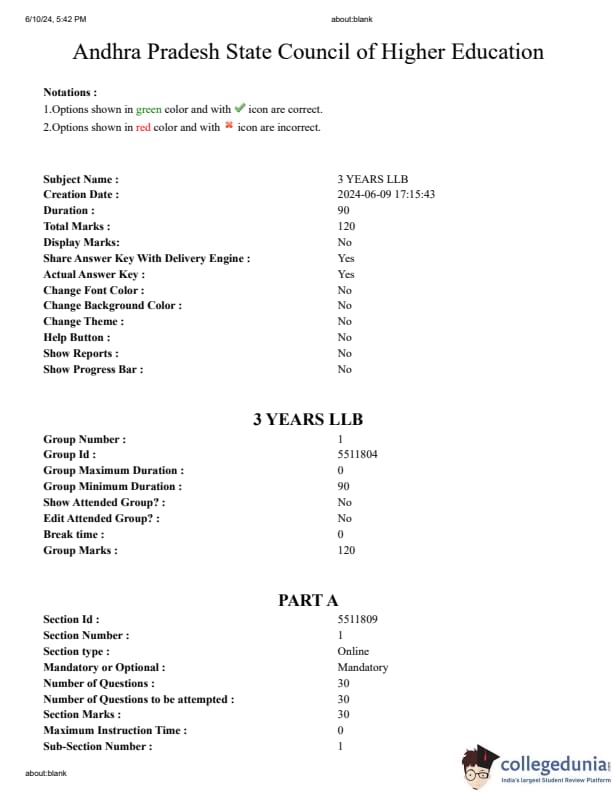
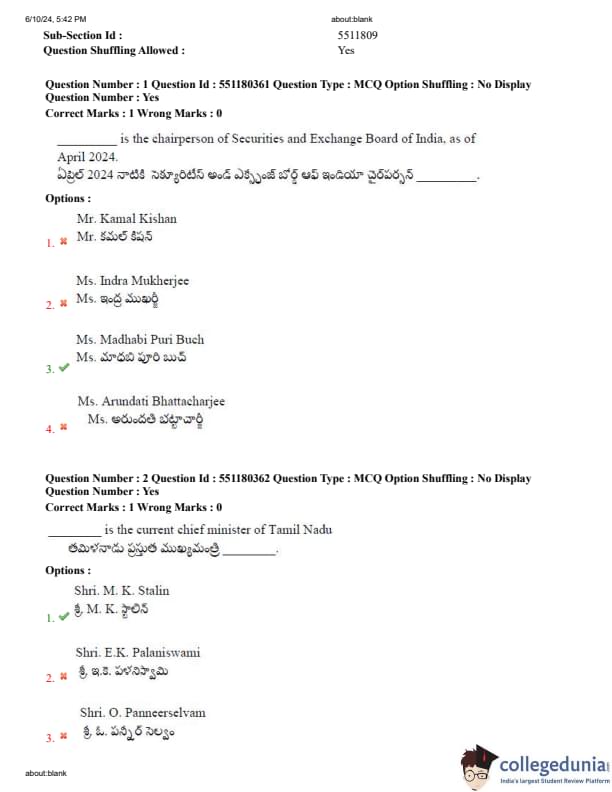
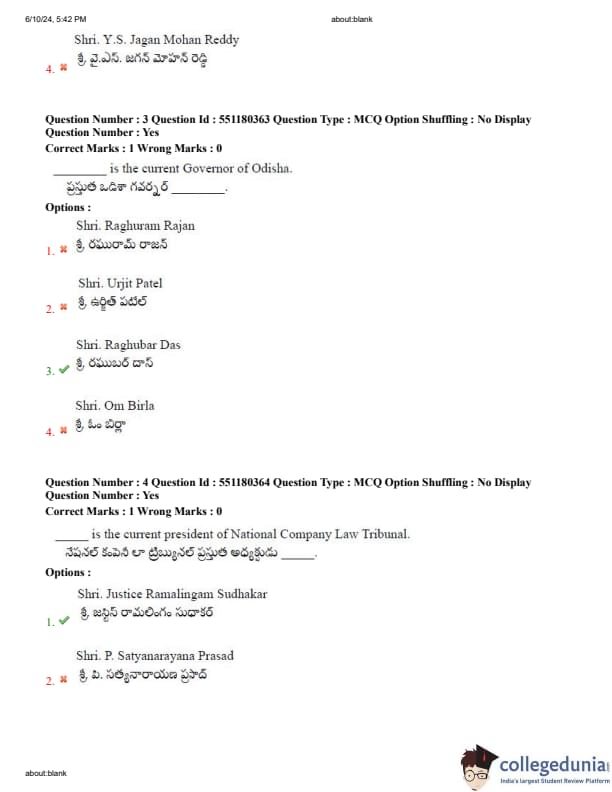
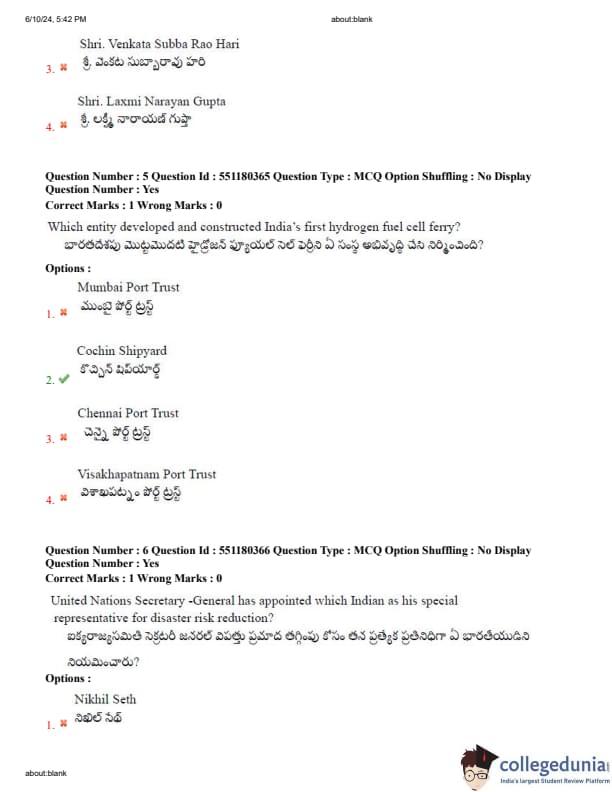
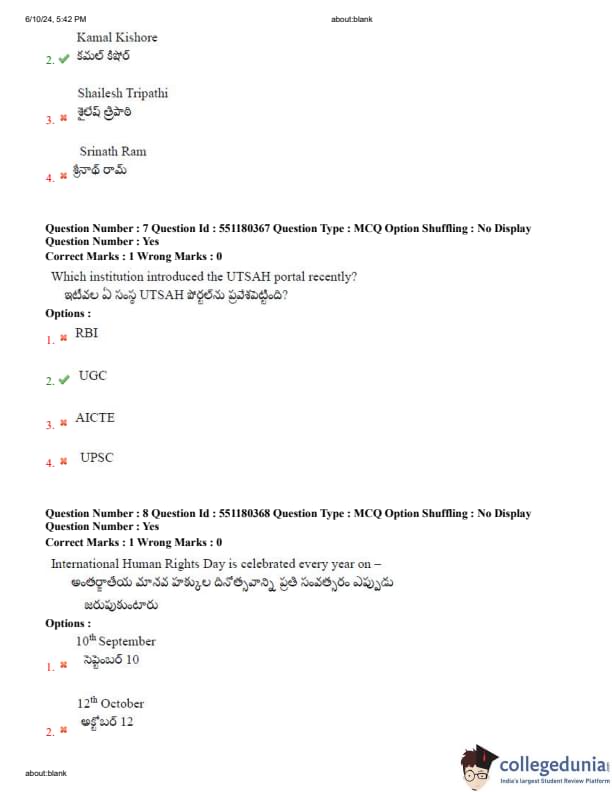
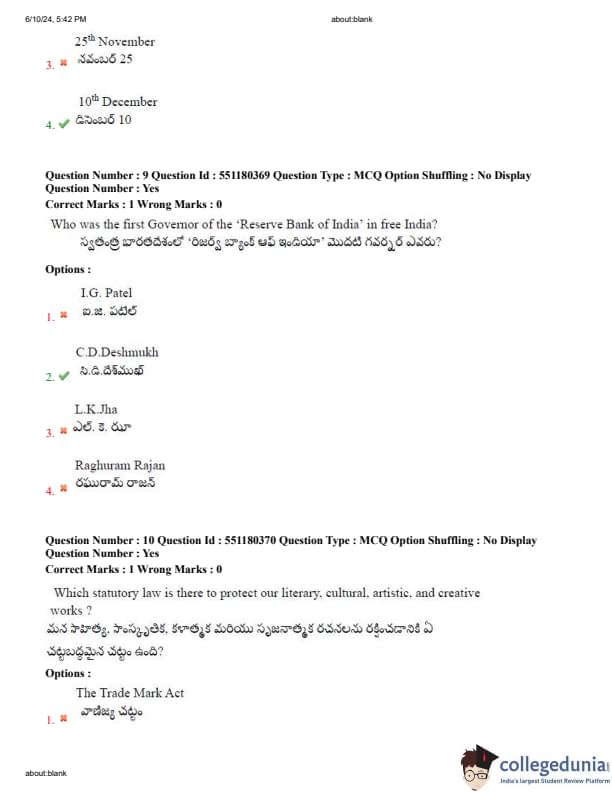
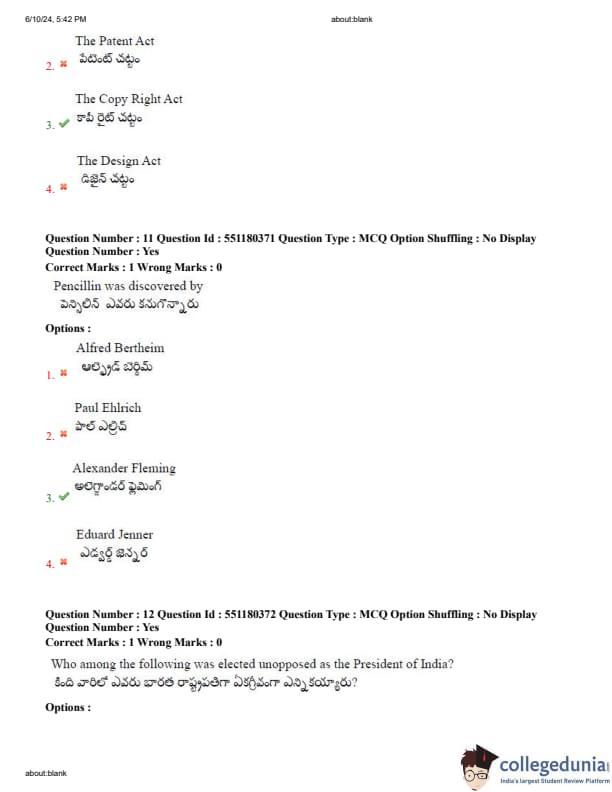
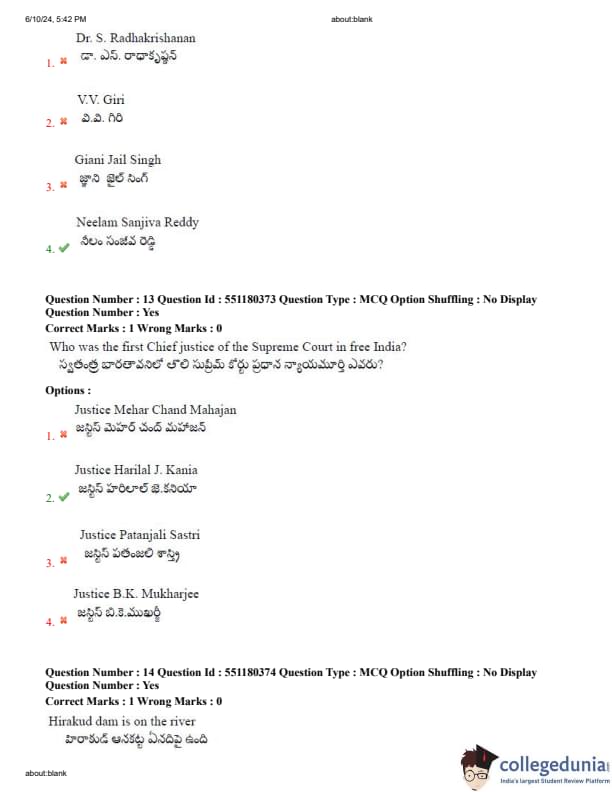
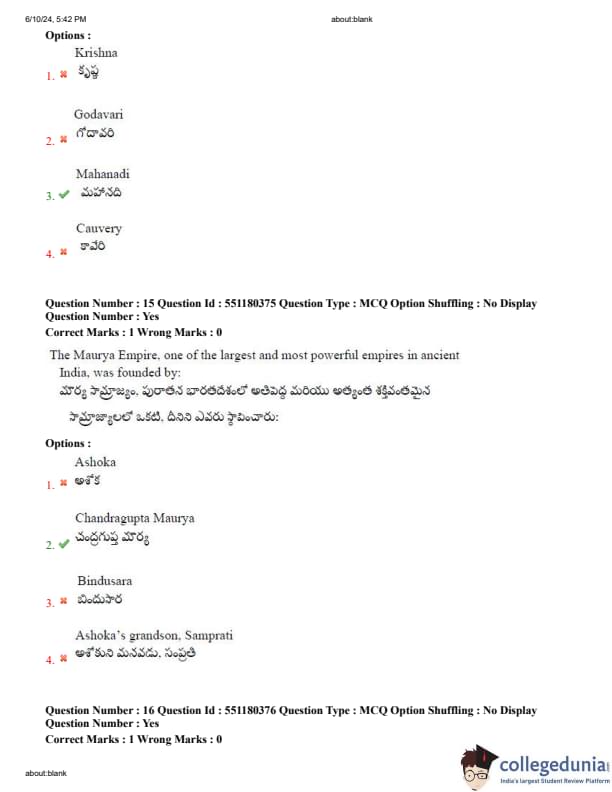
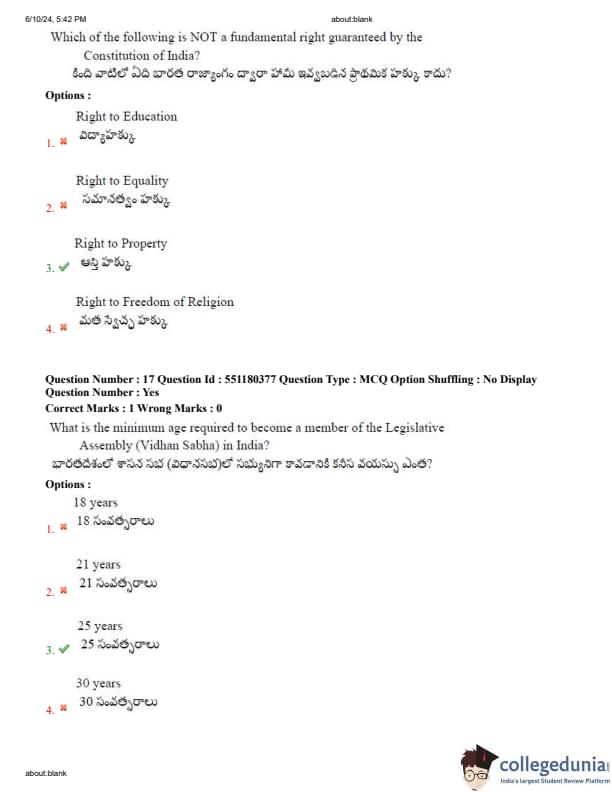
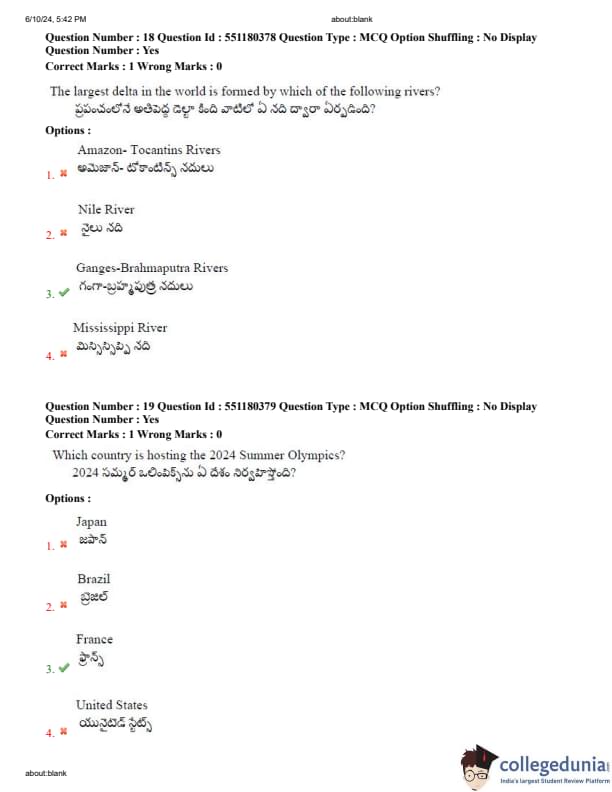
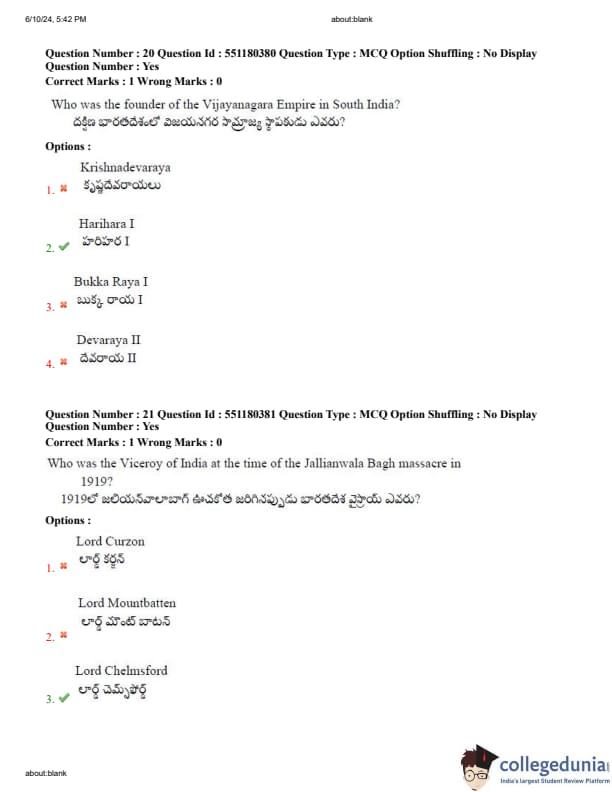
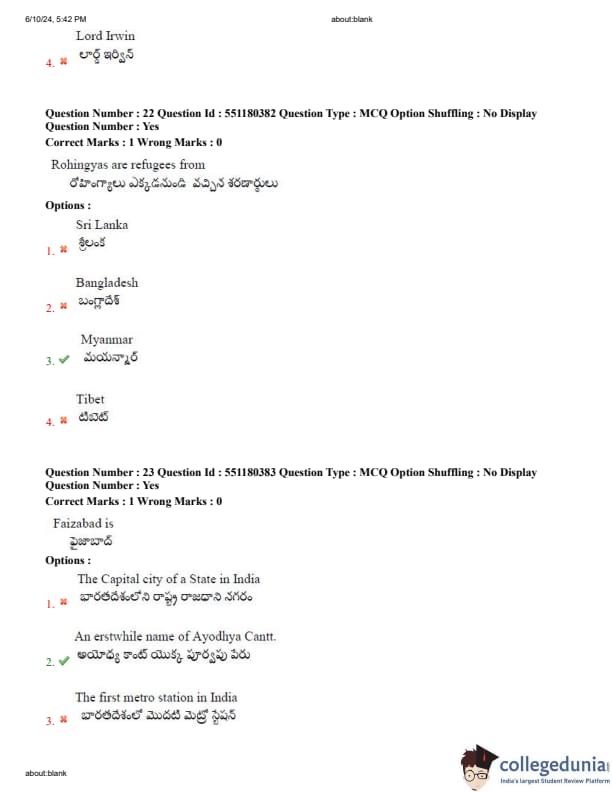
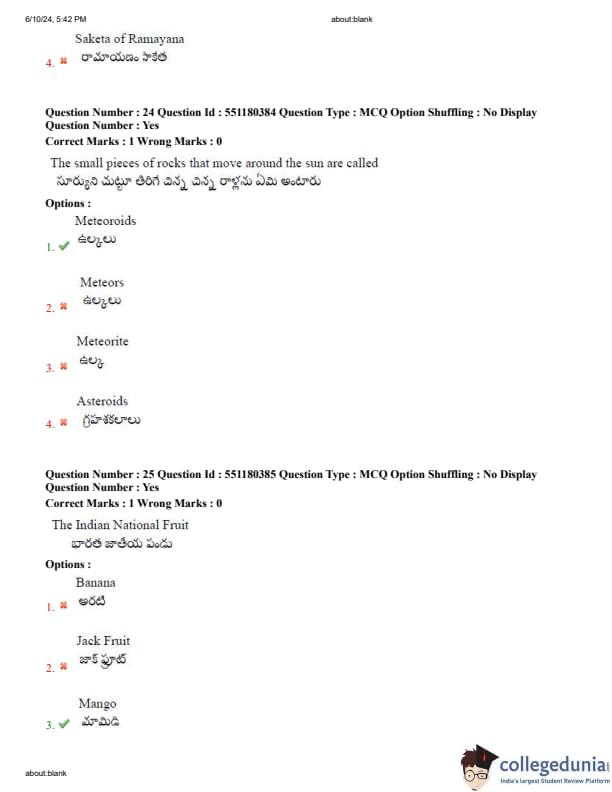
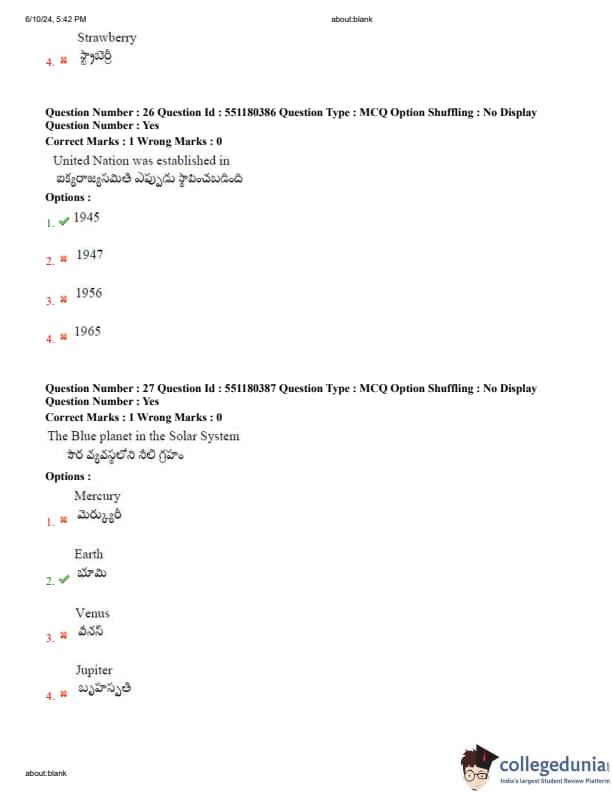
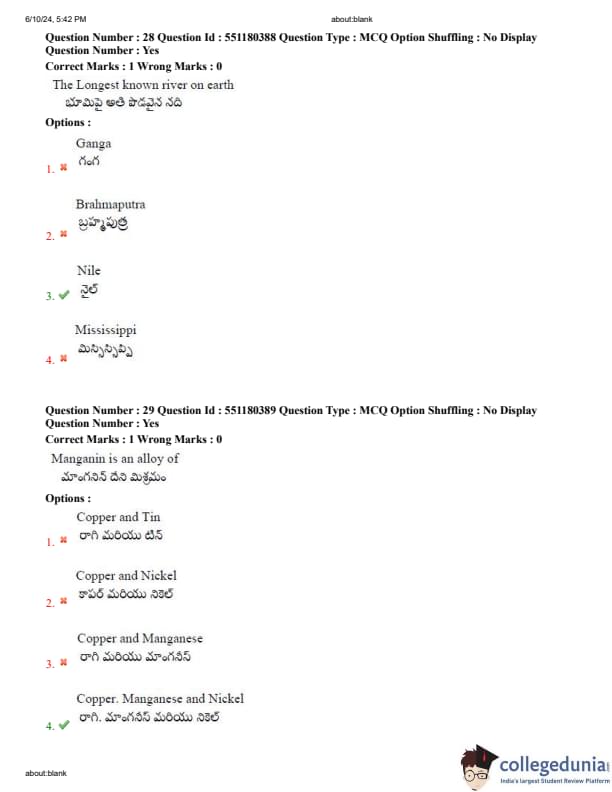
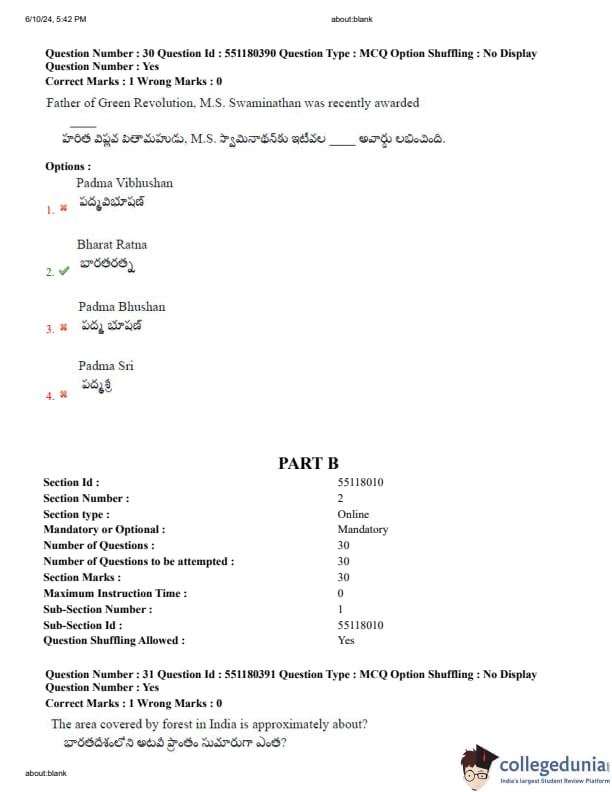
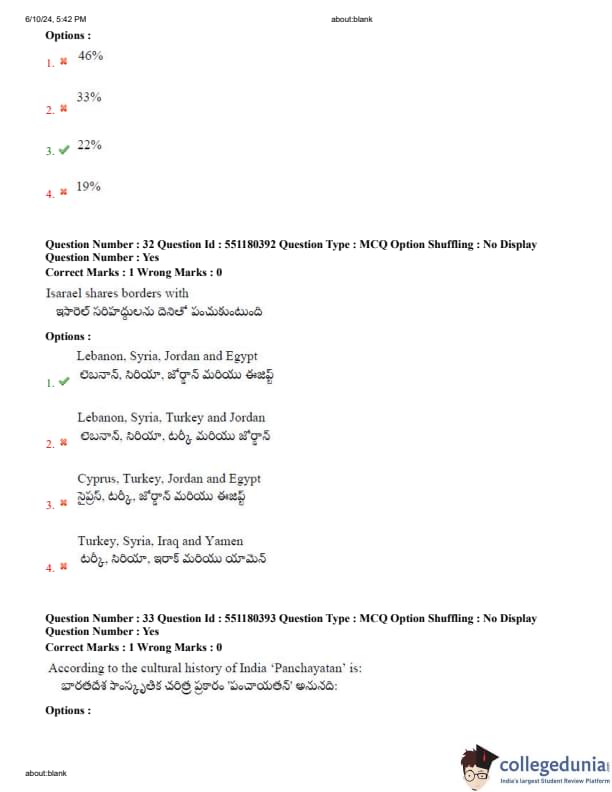
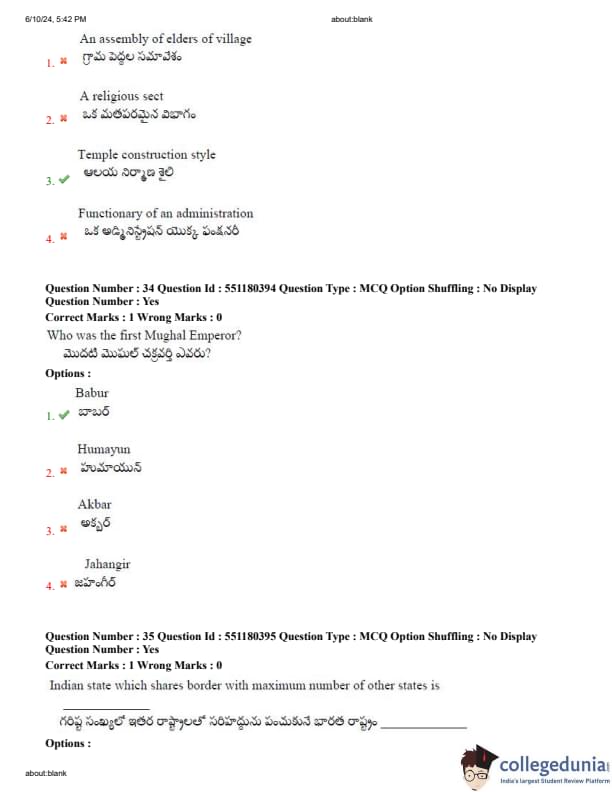
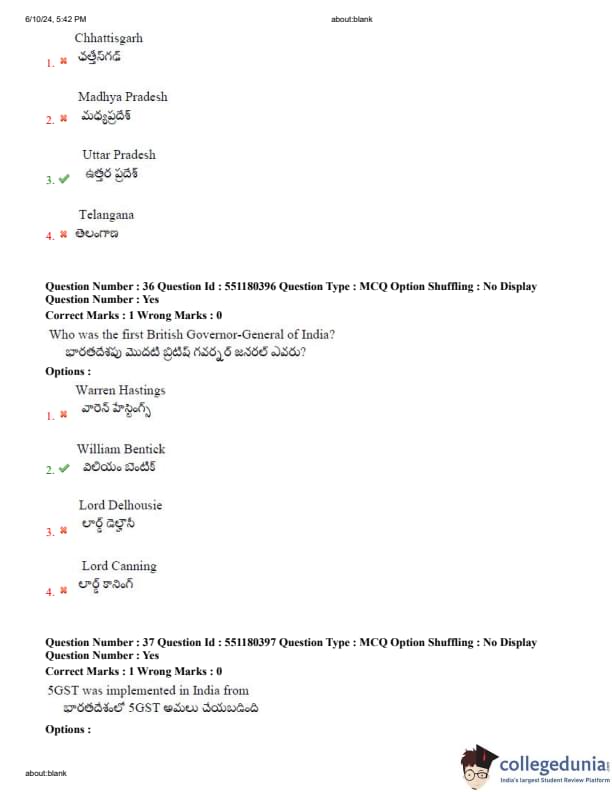
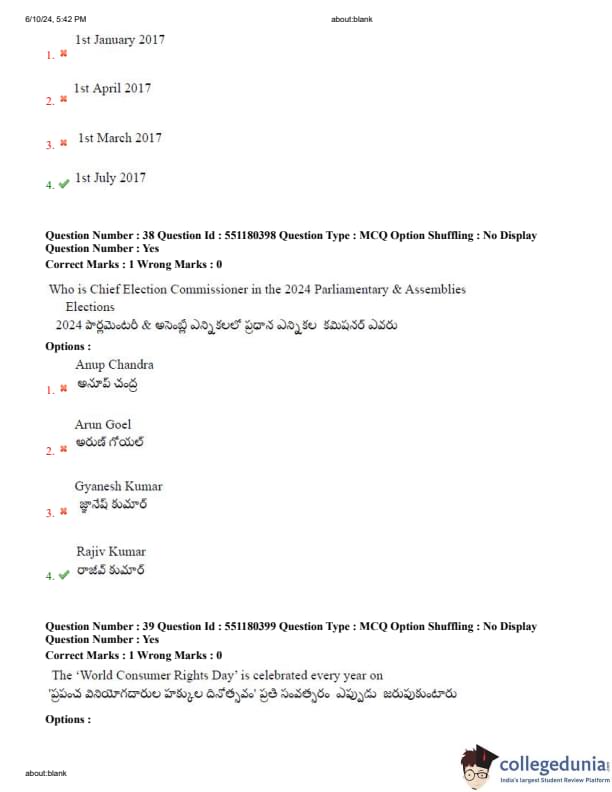
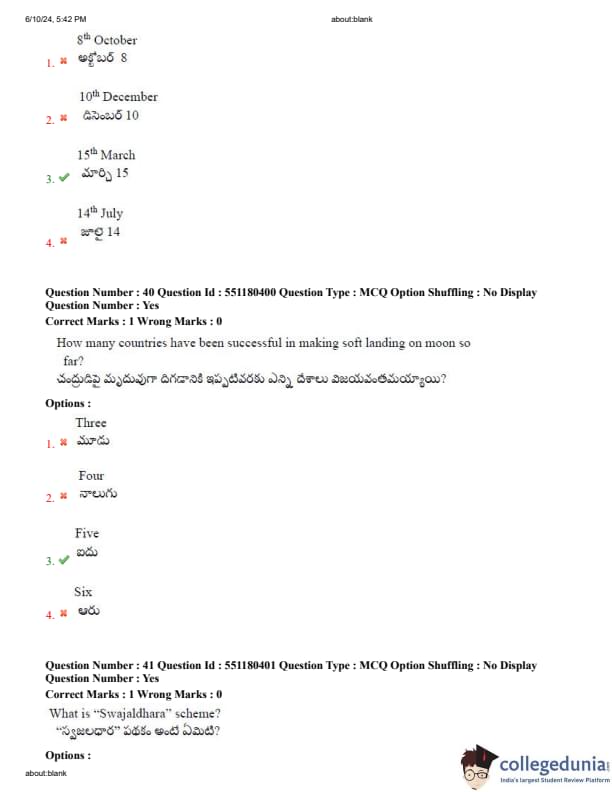
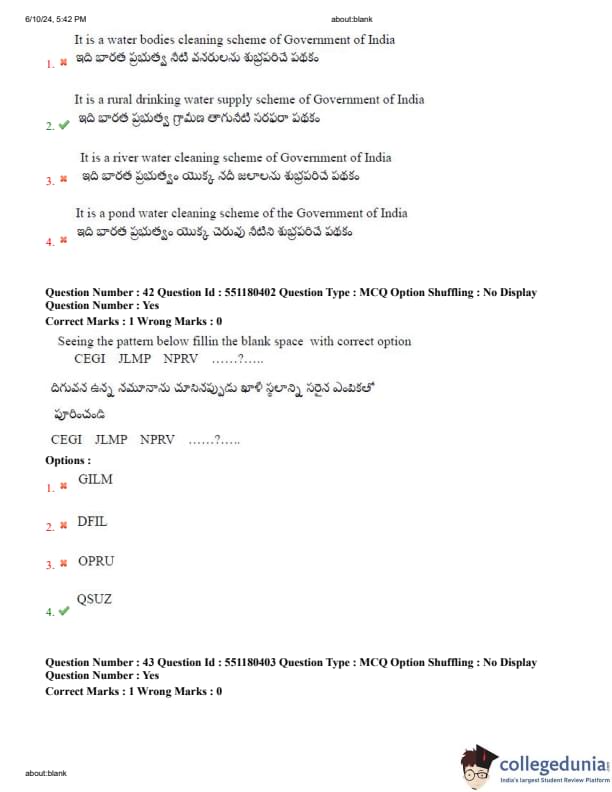
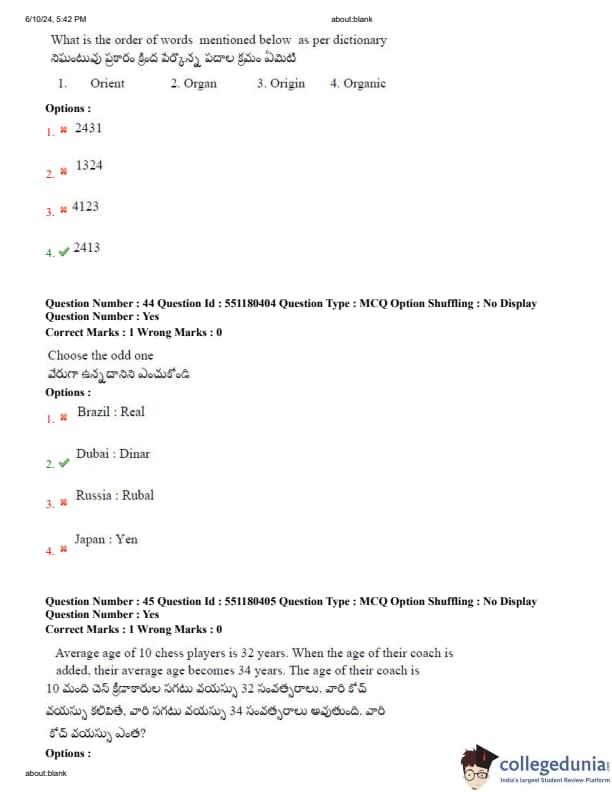
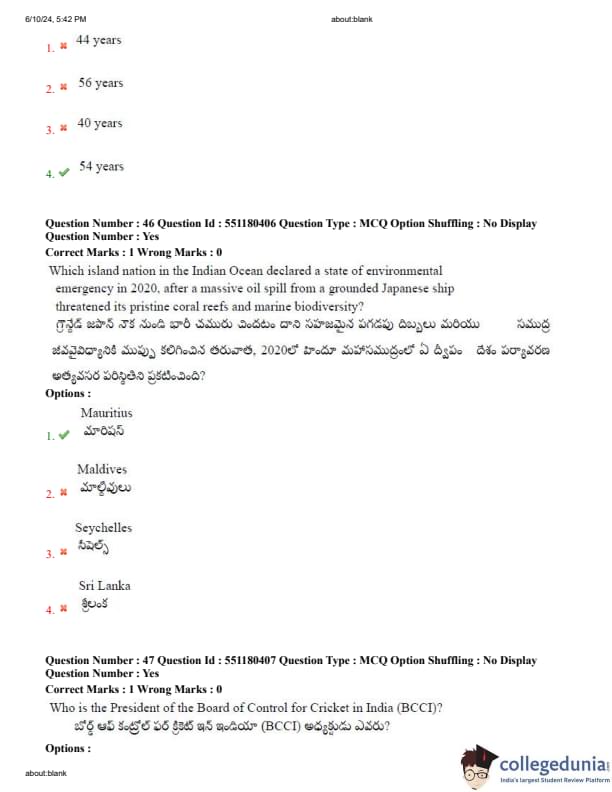
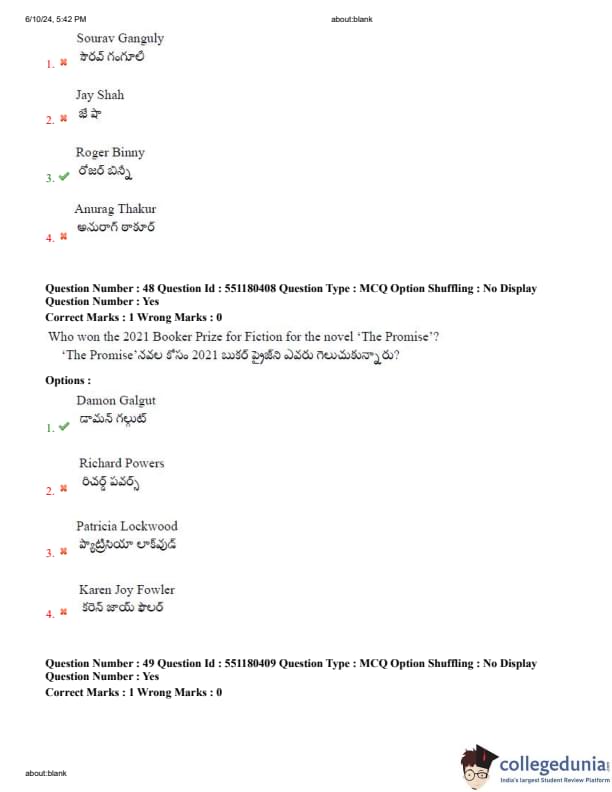
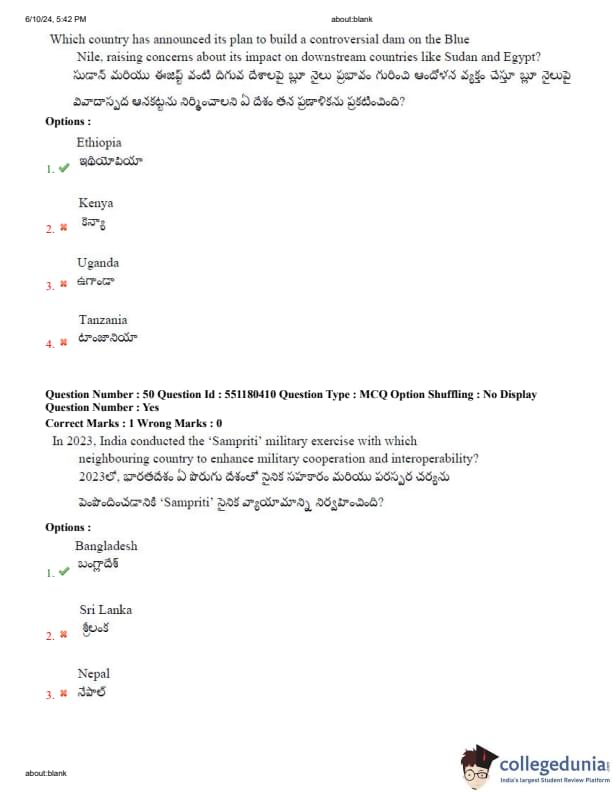
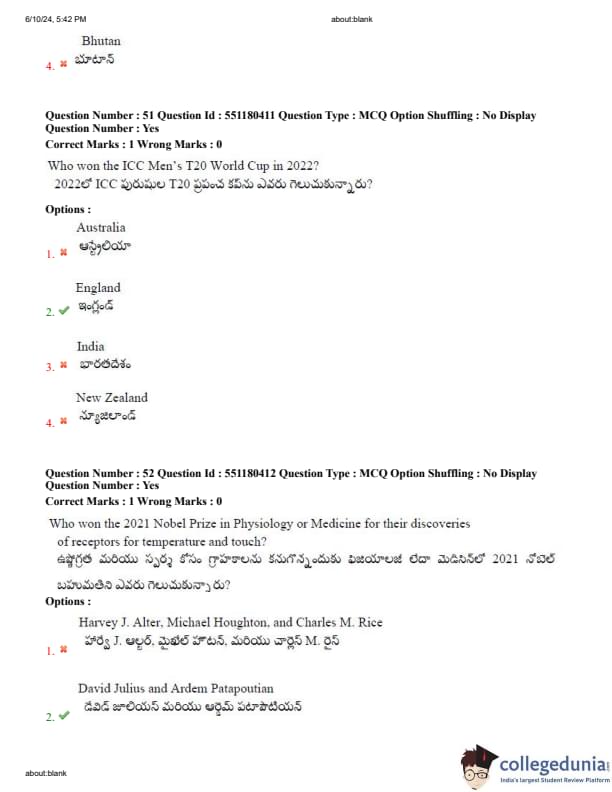
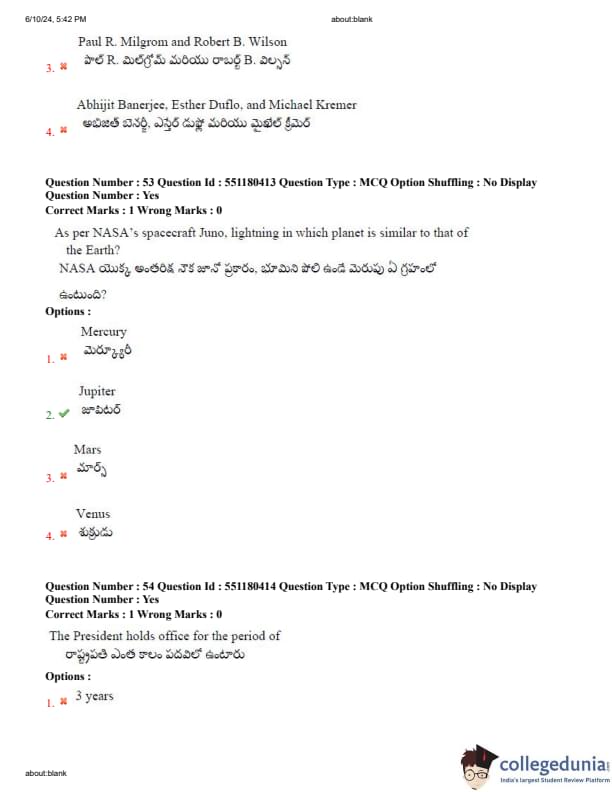
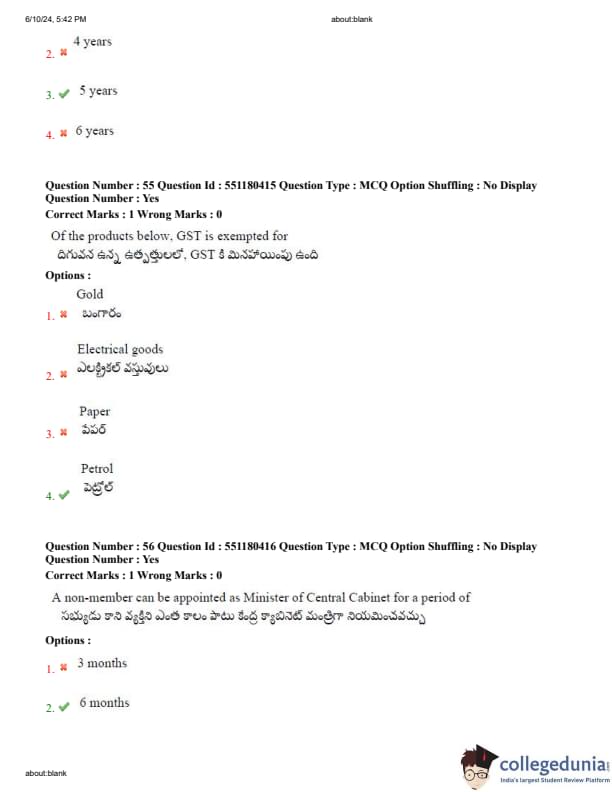
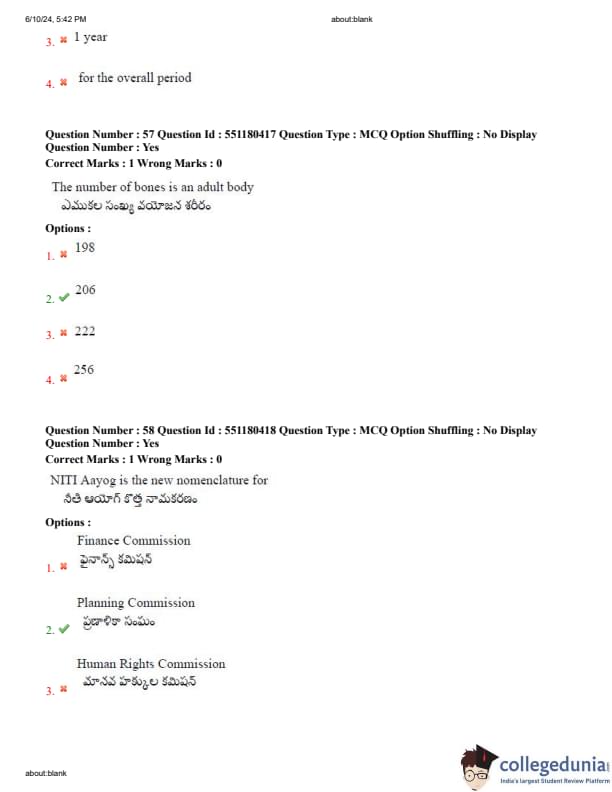
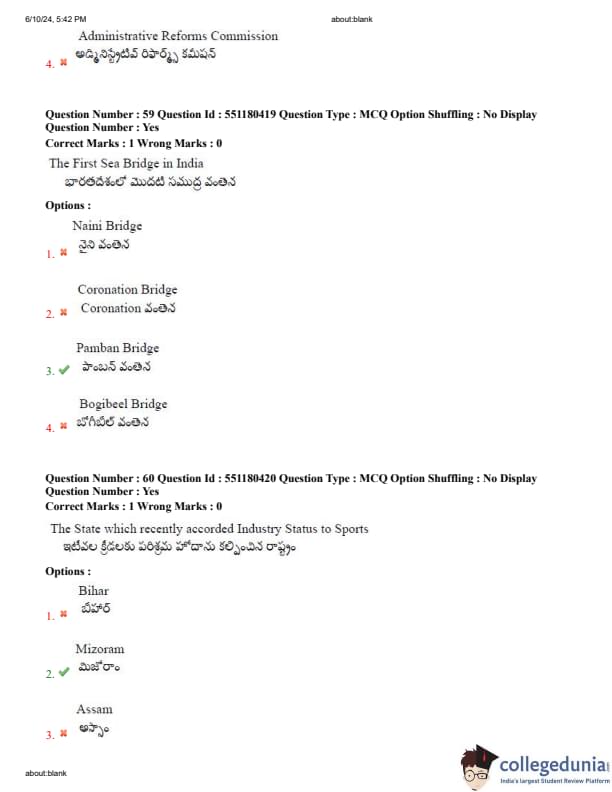
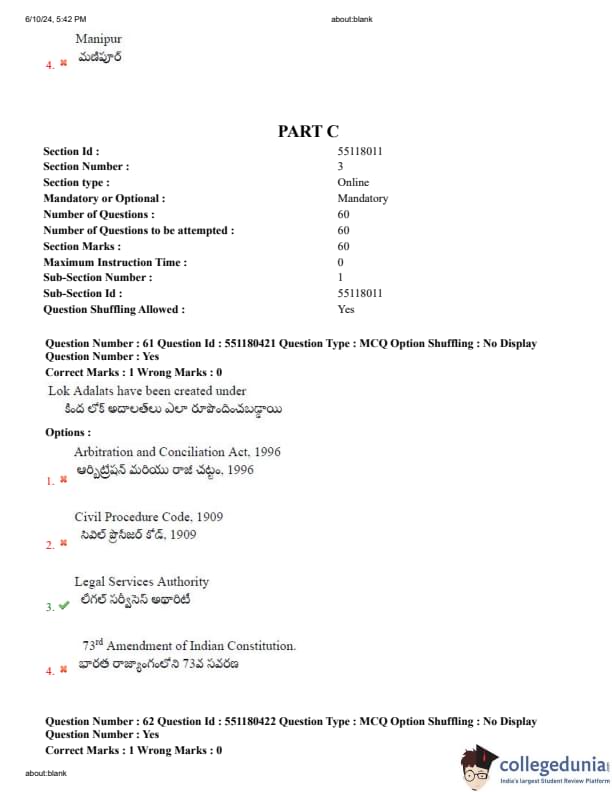
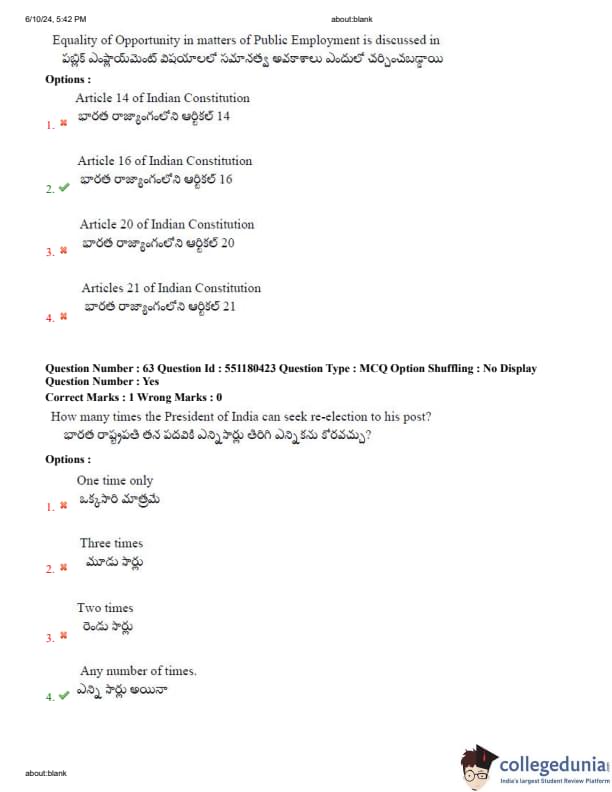
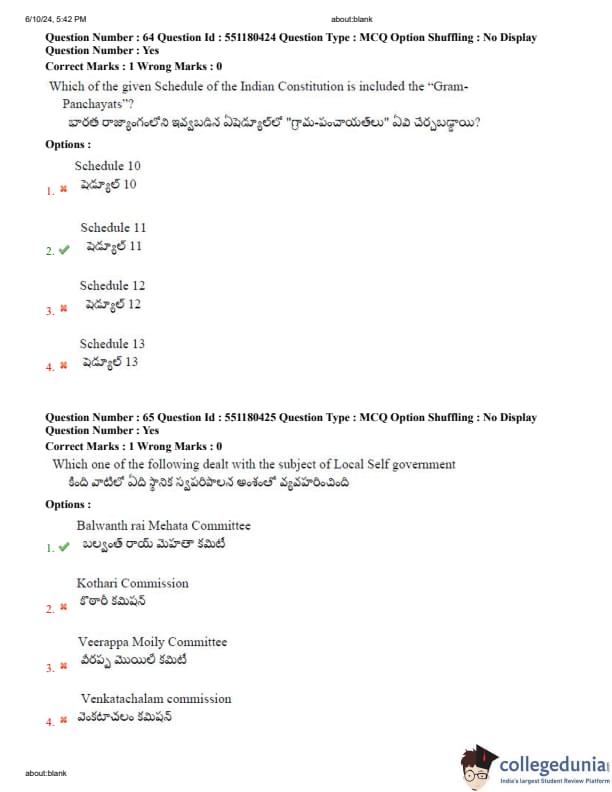
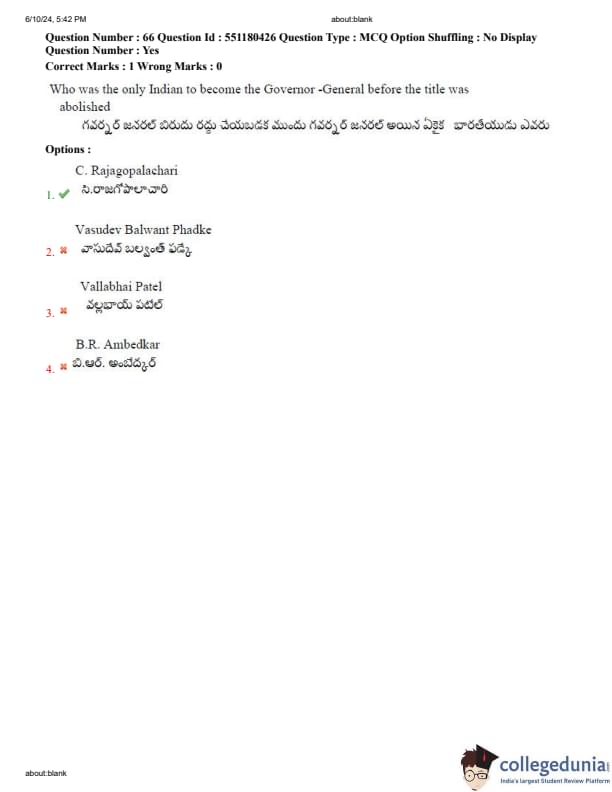
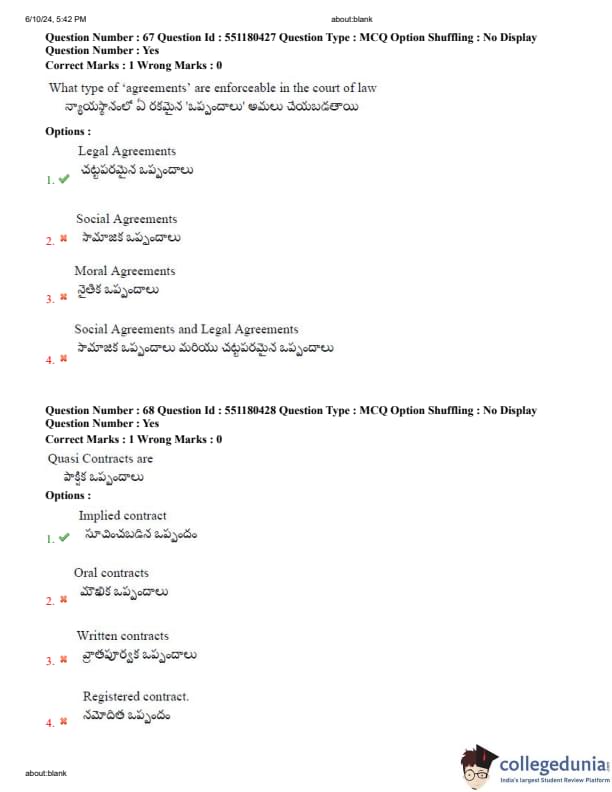
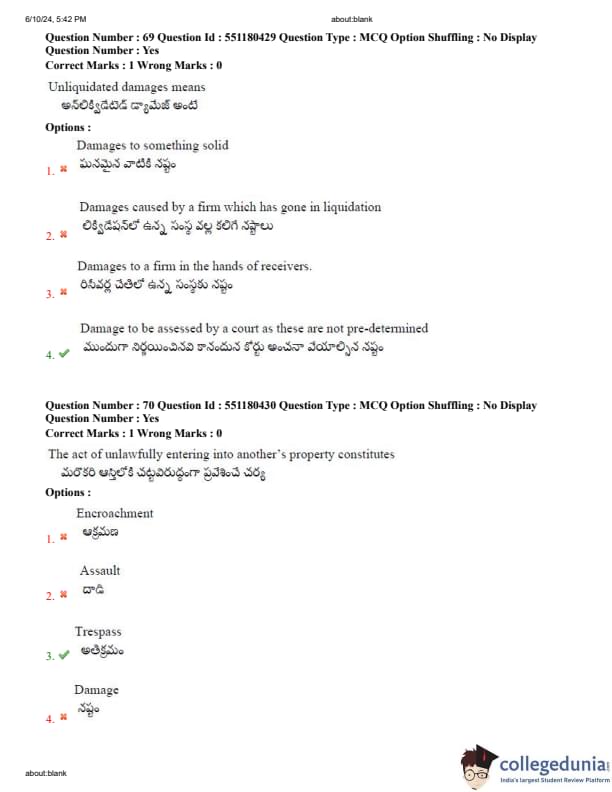
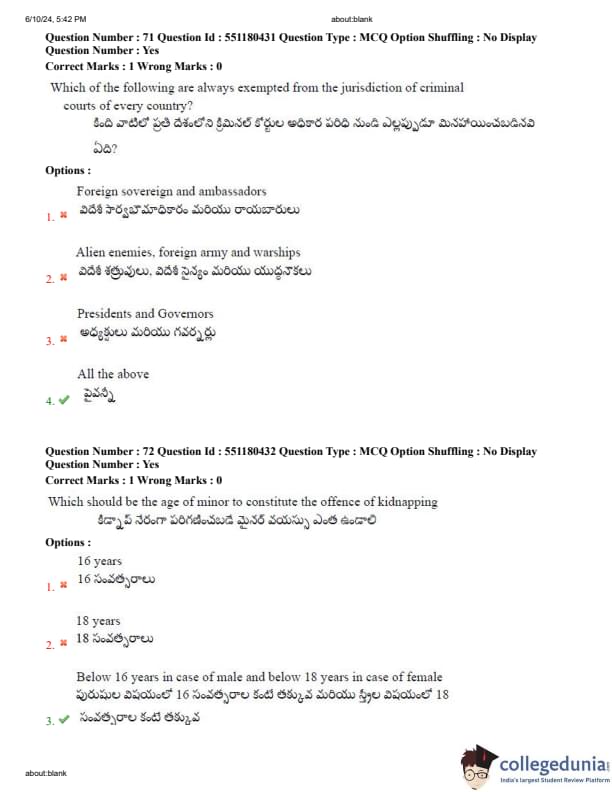
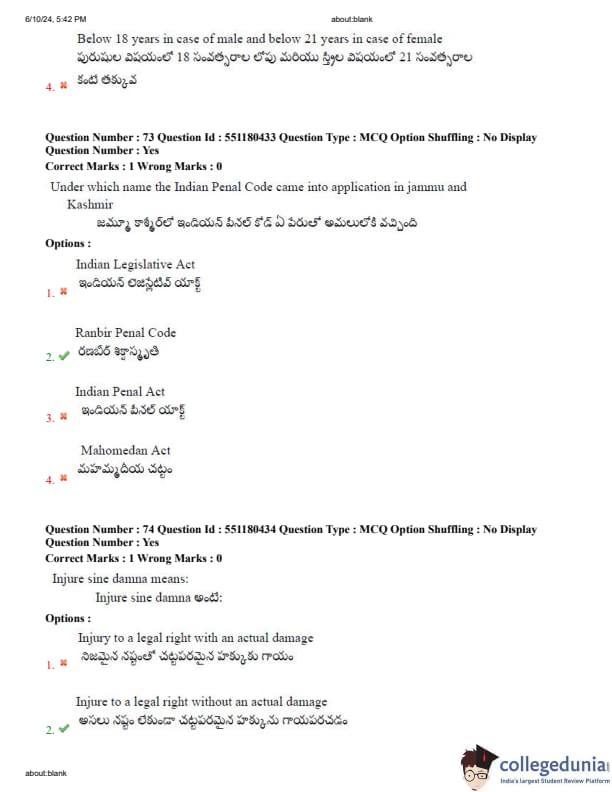
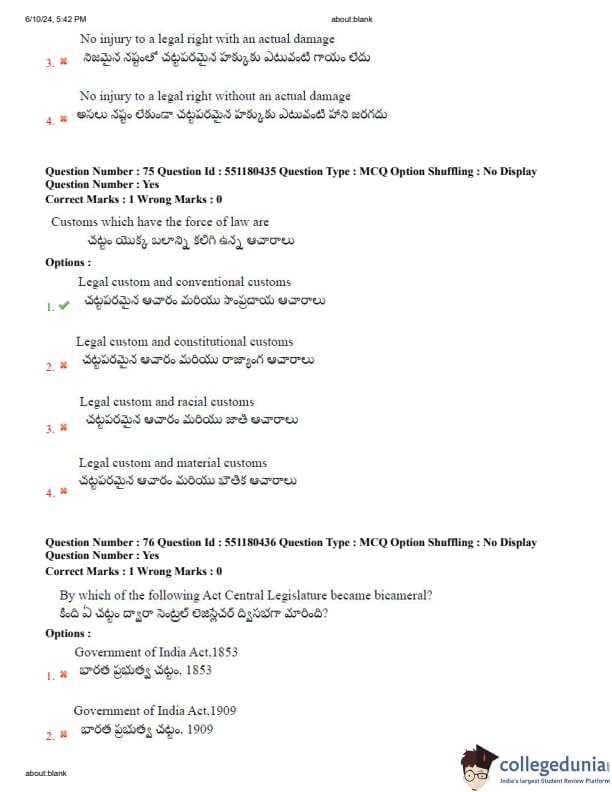
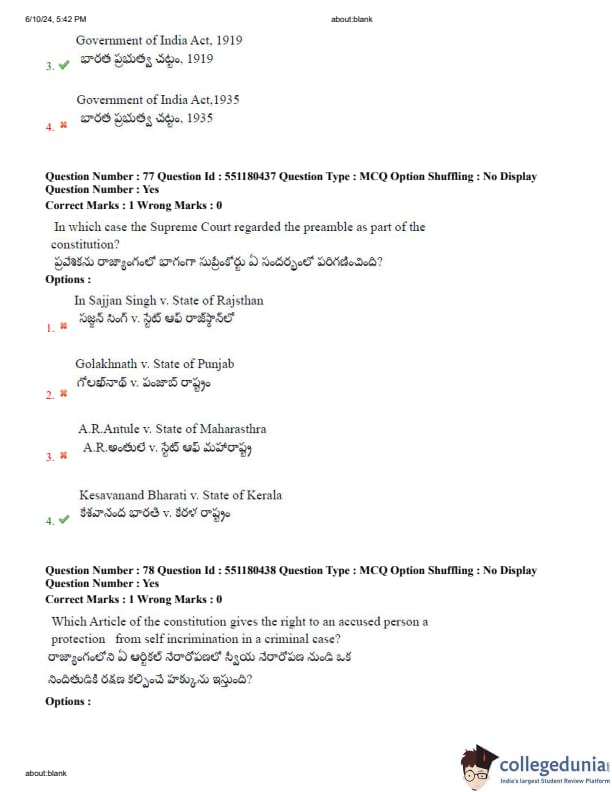
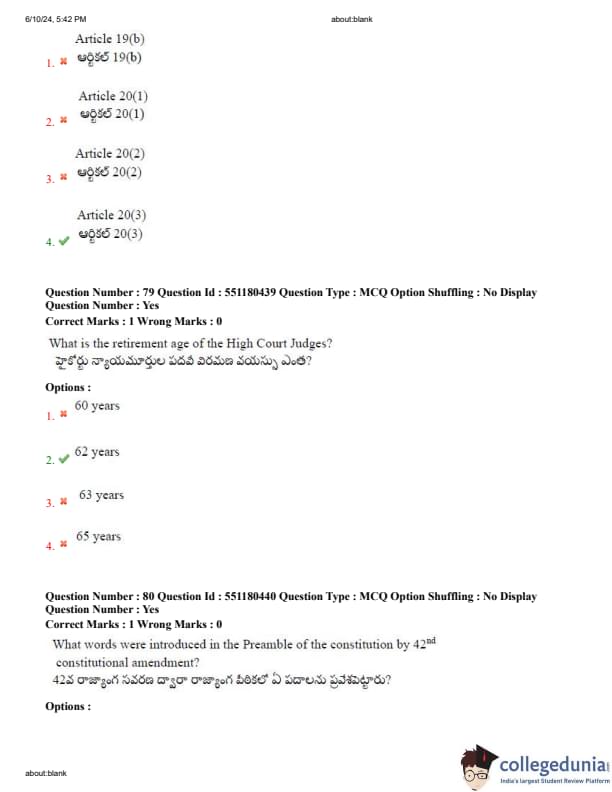
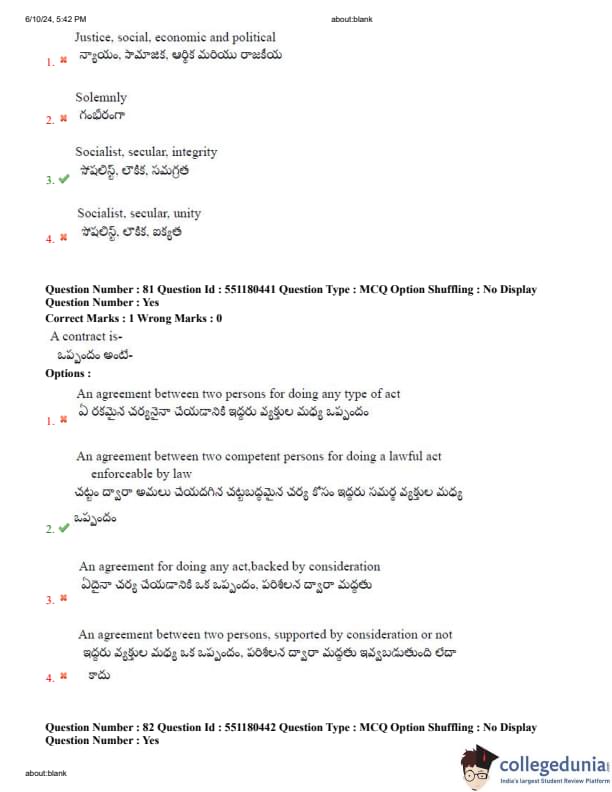
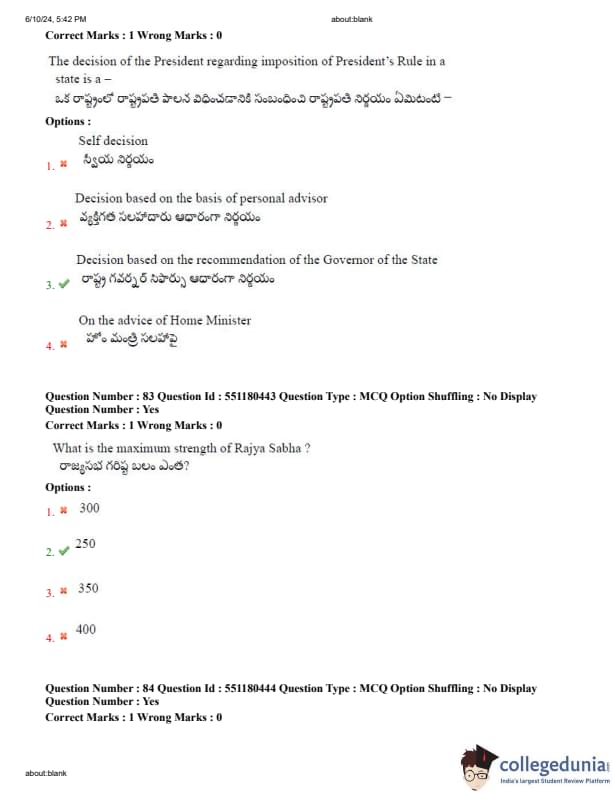
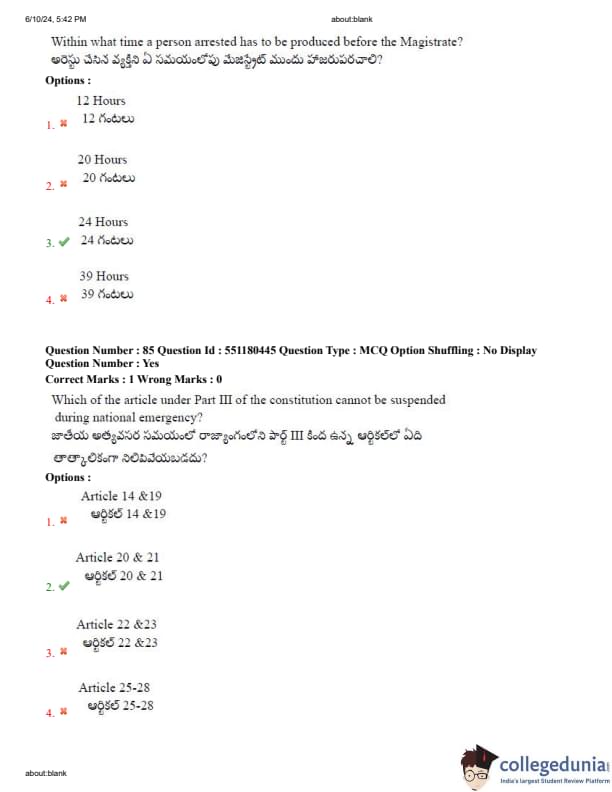
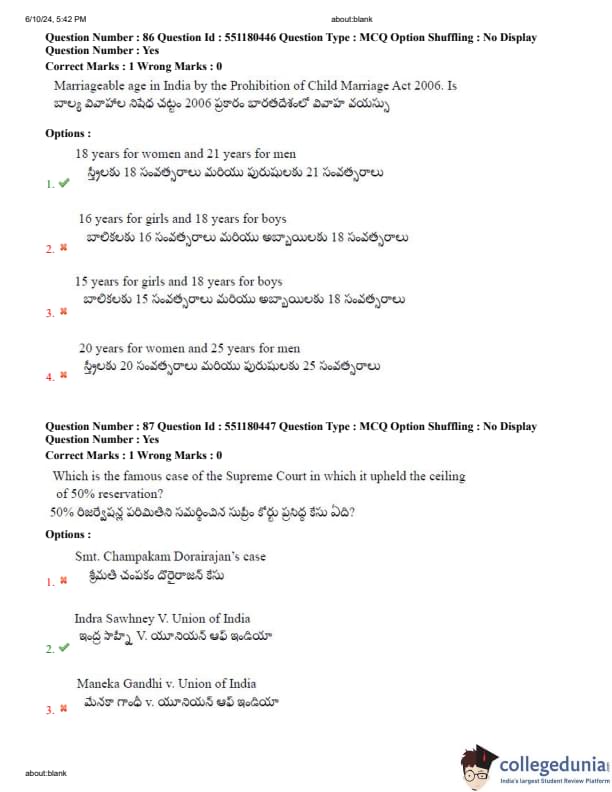
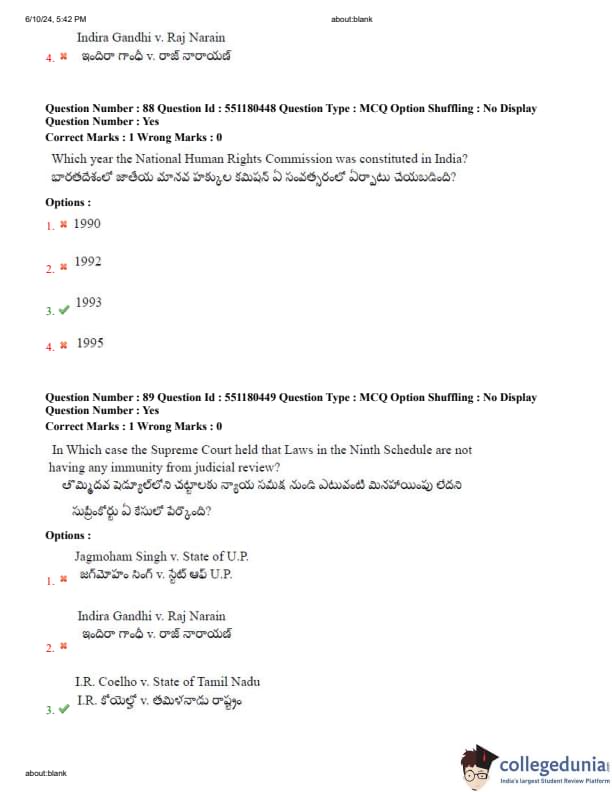
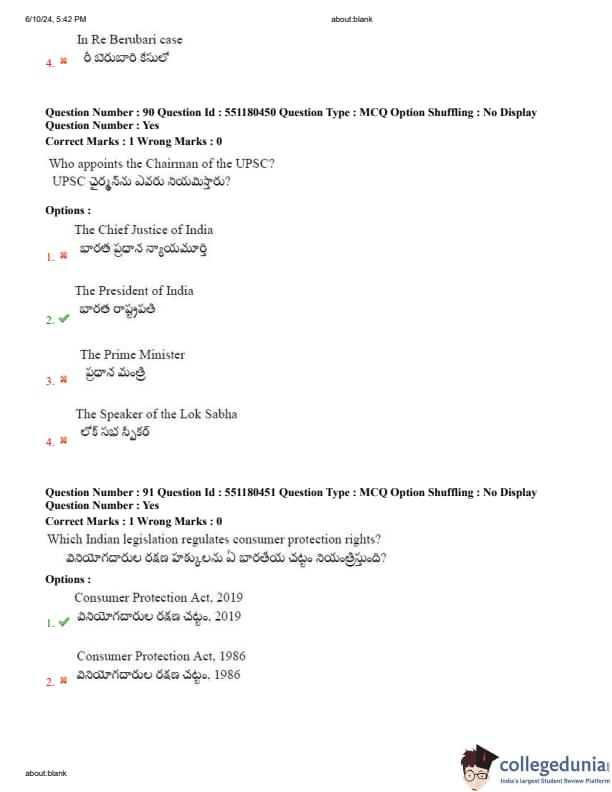
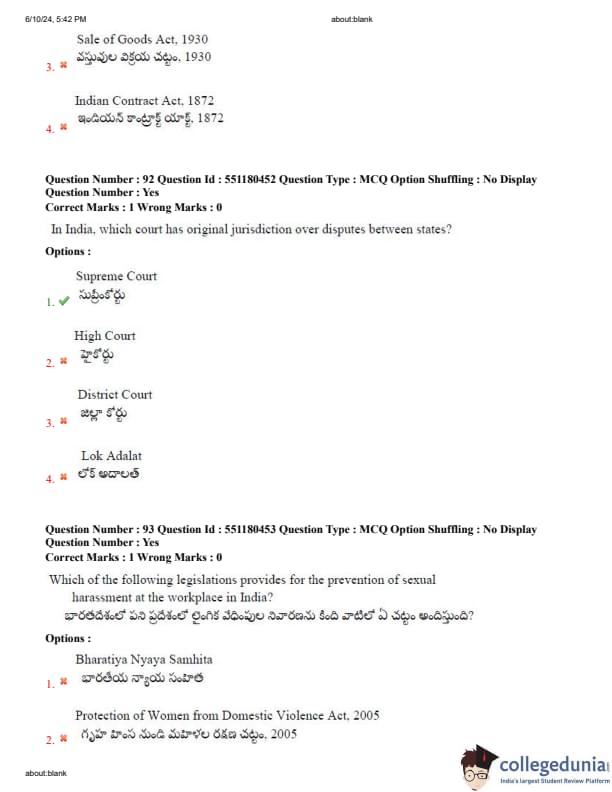
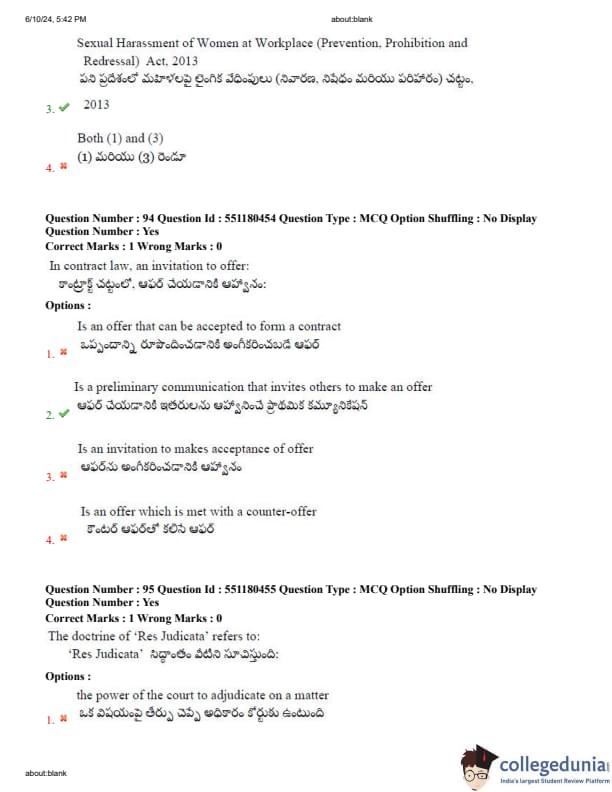
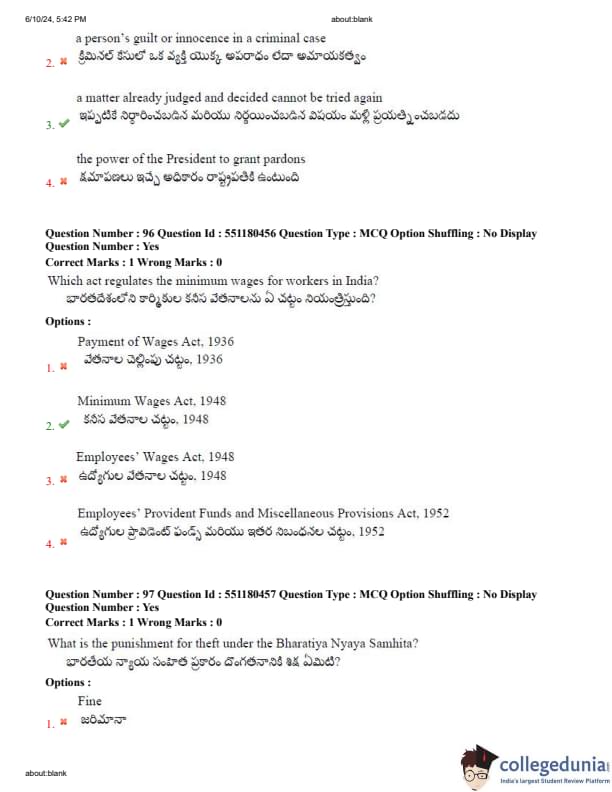
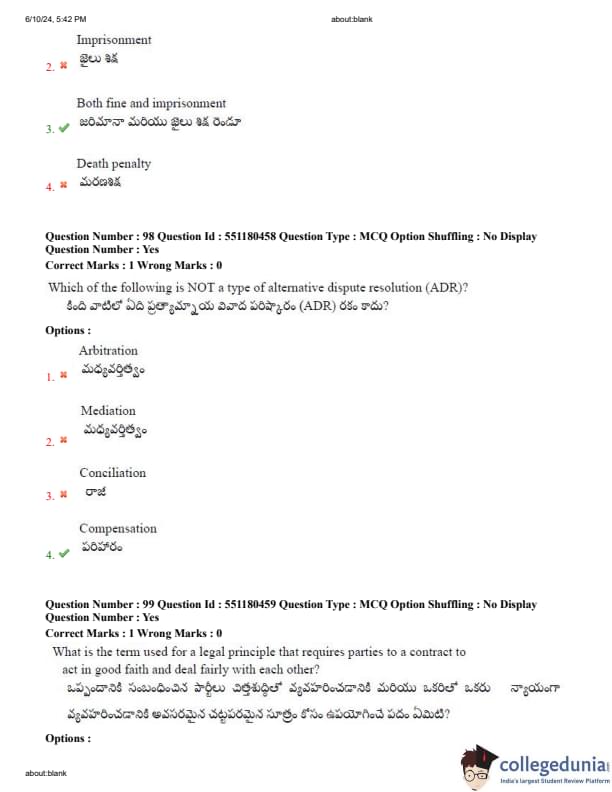
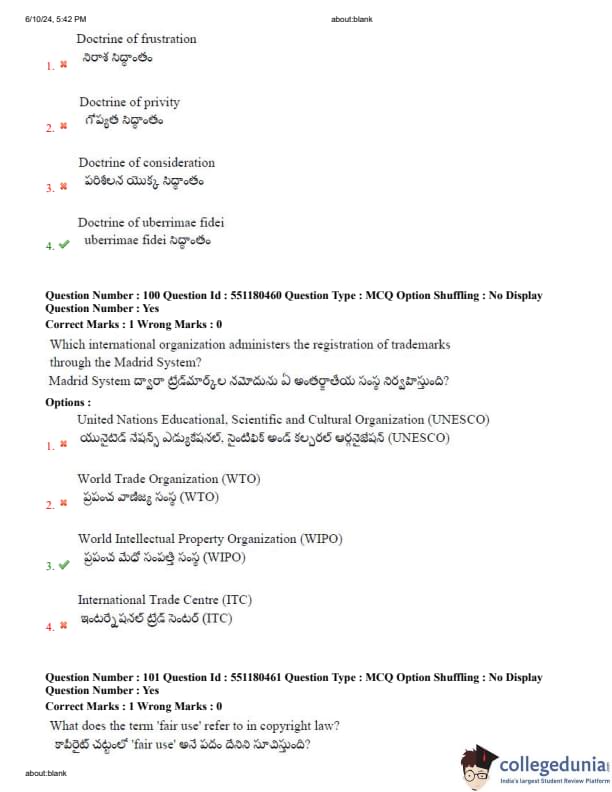
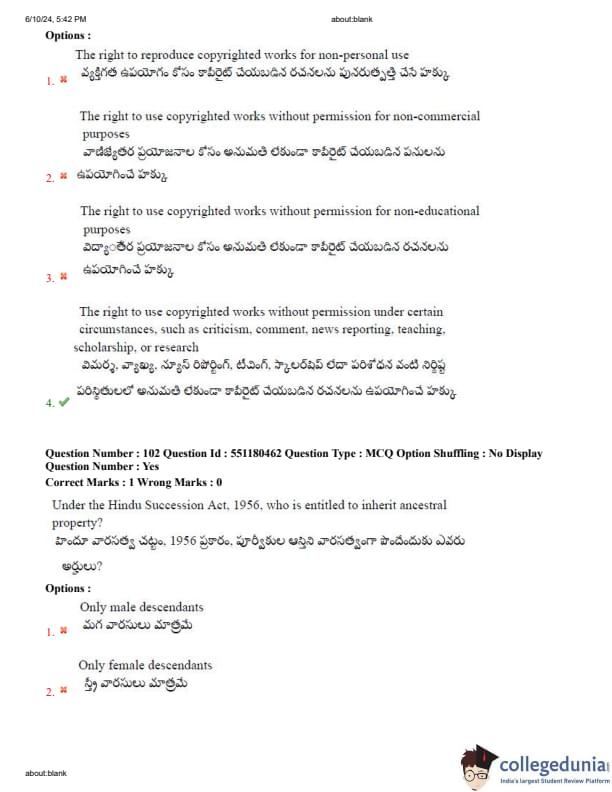
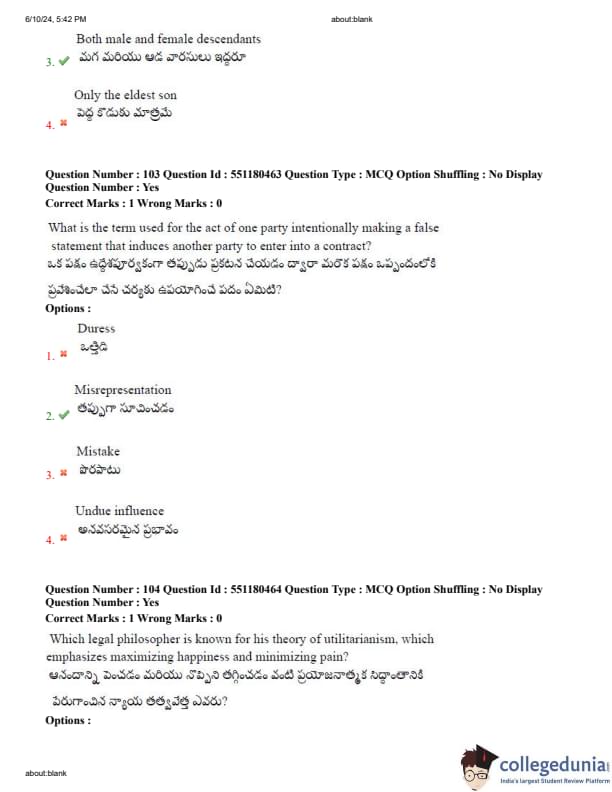
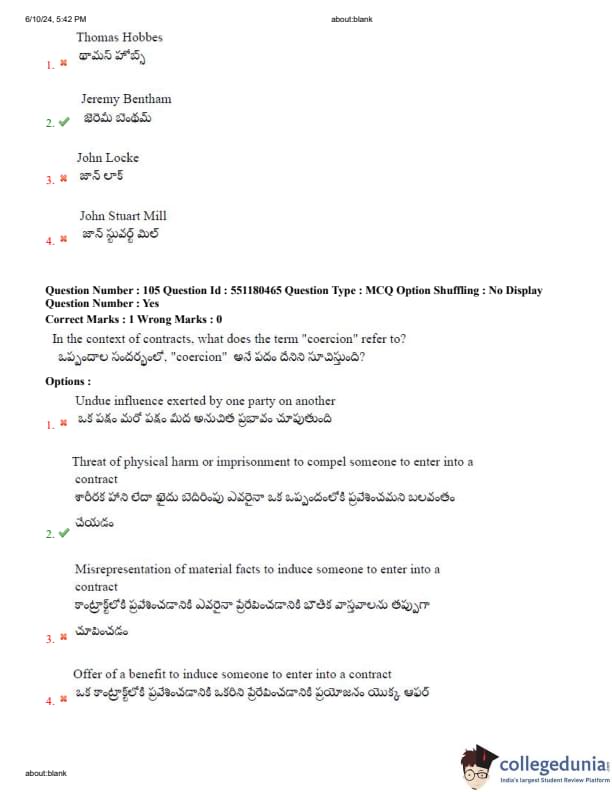
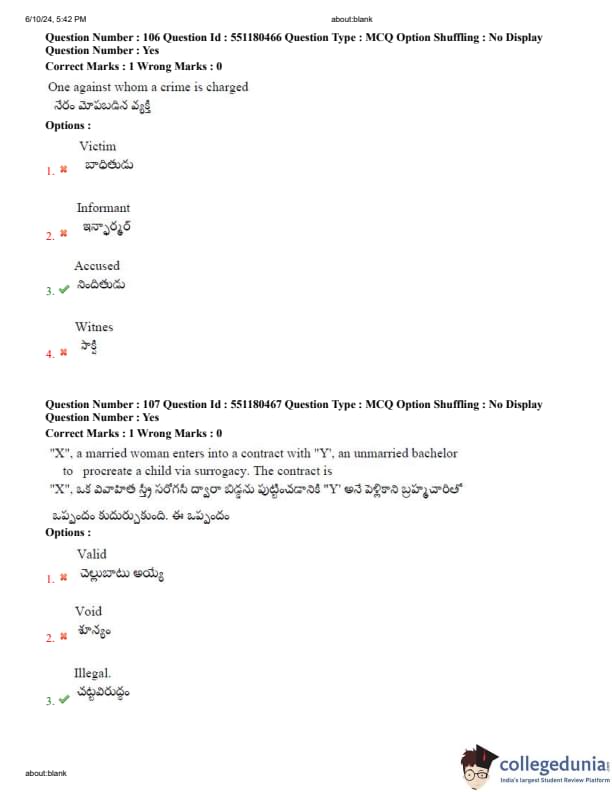
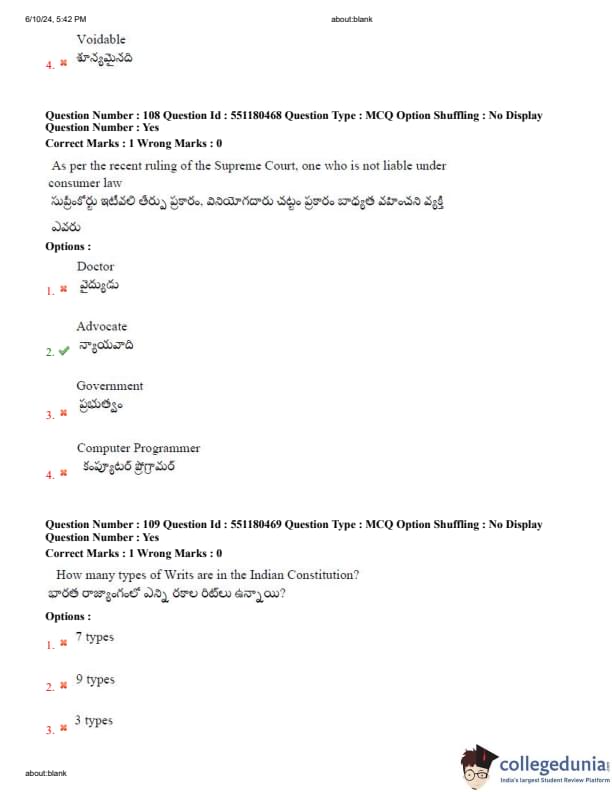
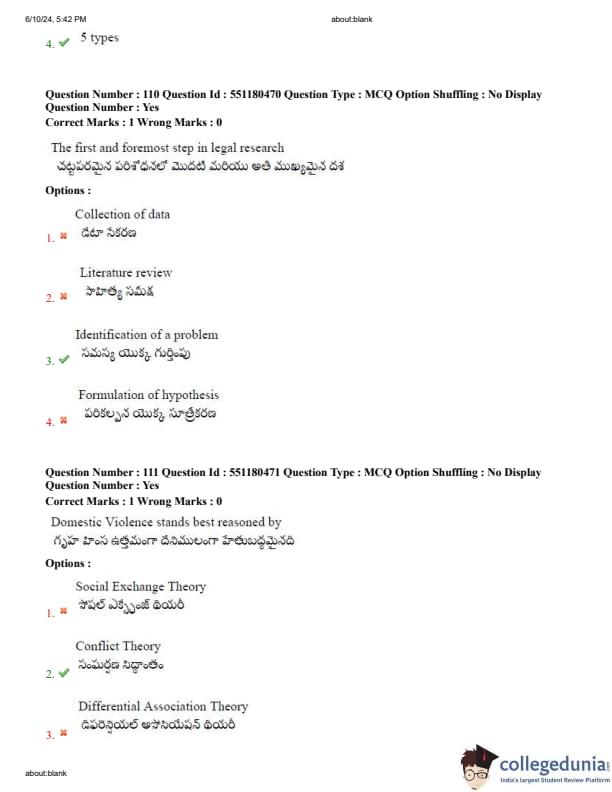
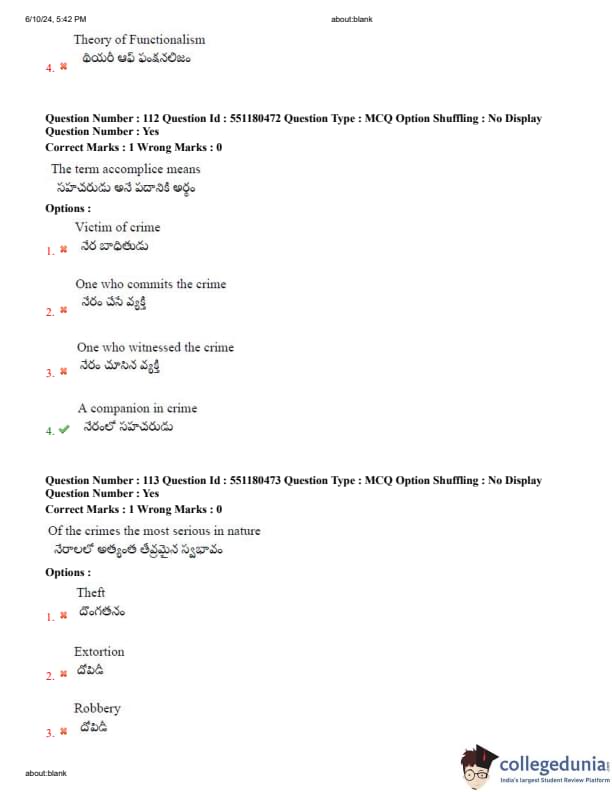
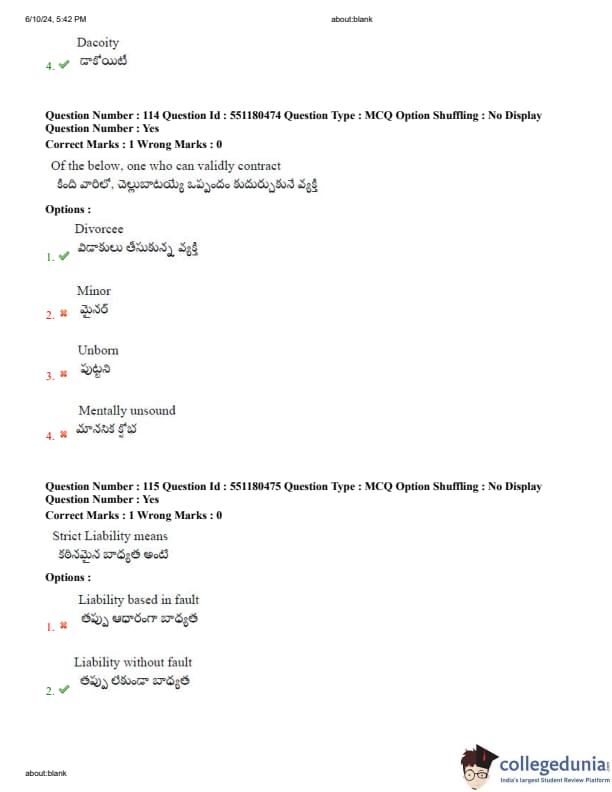
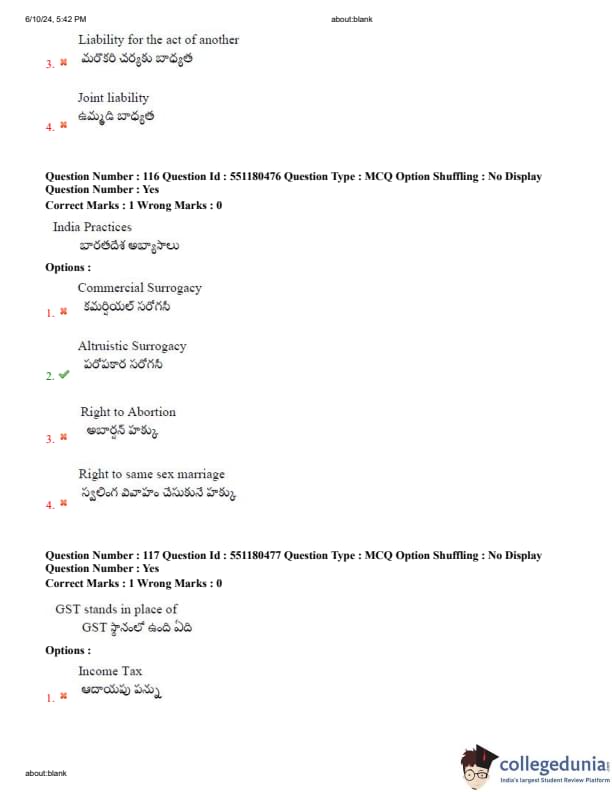
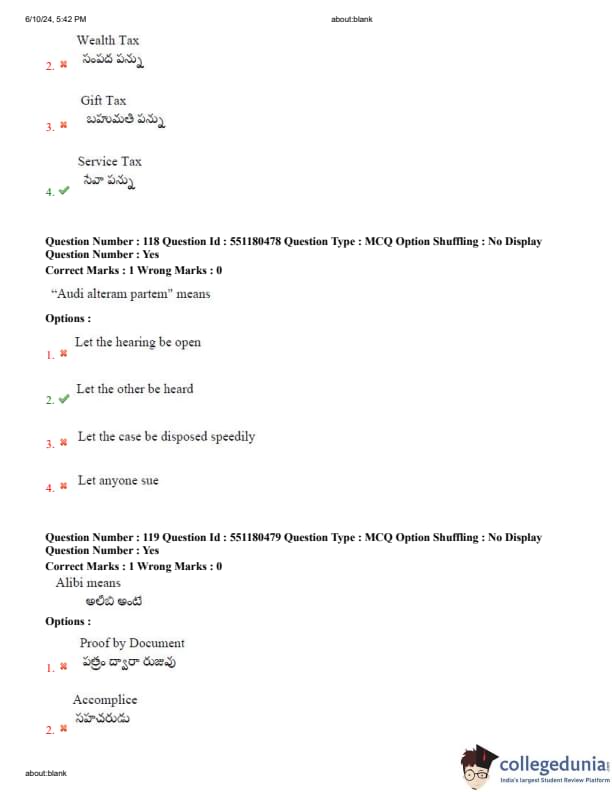
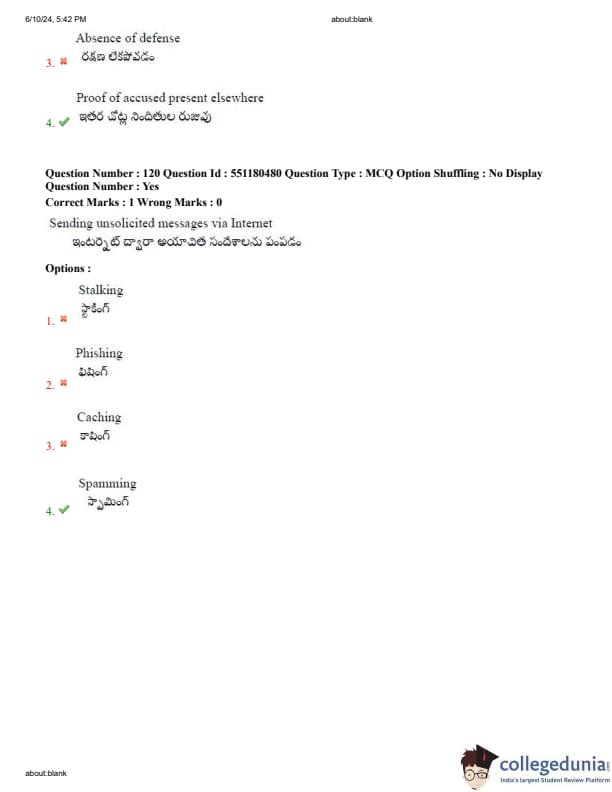


Comments